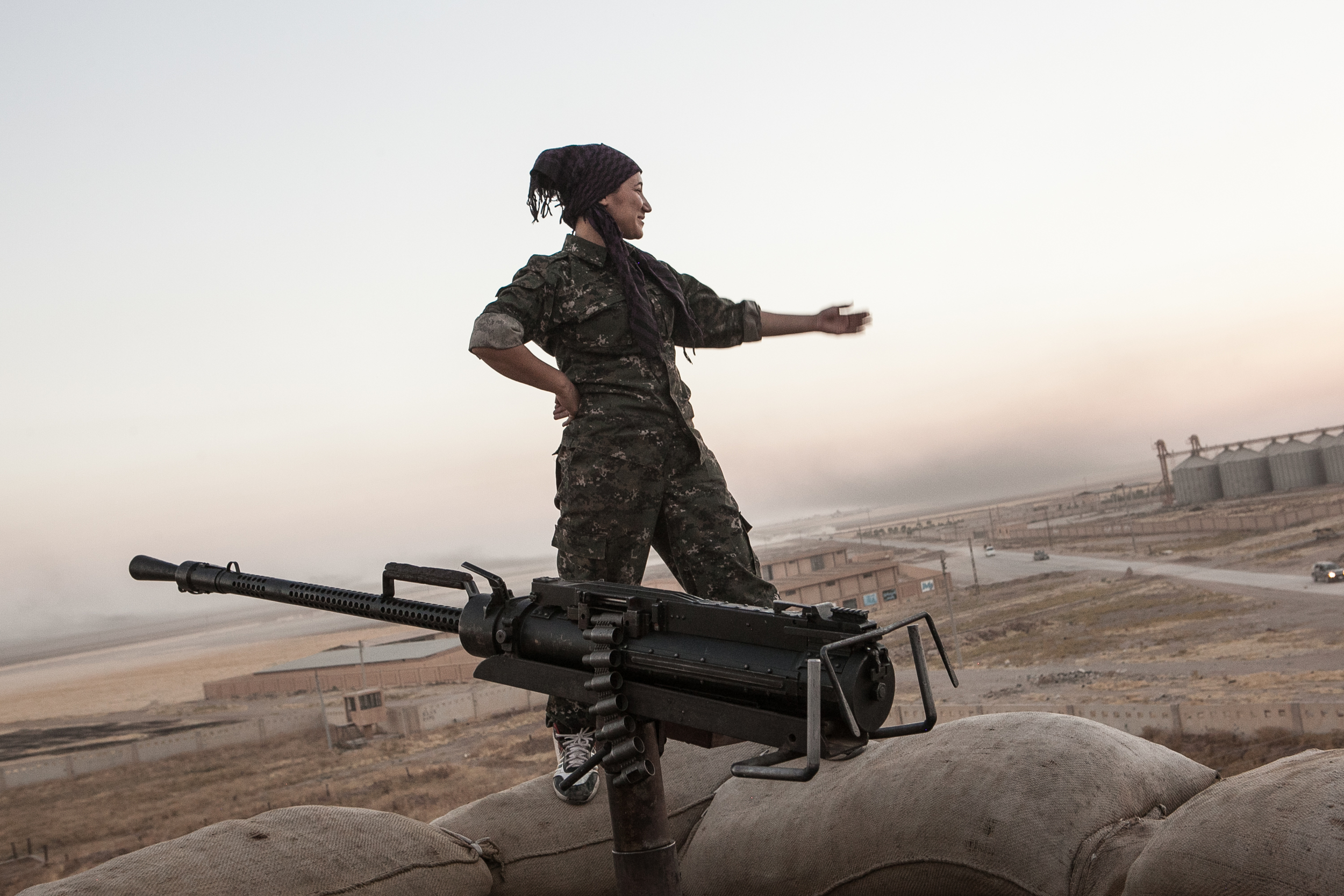
A Kurdish YPJ soldiers waves at carloads of refugees escaping ISIS near the town of Til Kocer on the Syrian-Iraq border.

We Are The YPJ
Along Syria’s northeastern border thousands of female soldiers are fighting an incalculably dangerous war. They are the Women's Protection Unit, the YPJ - an all-female Kurdish guerrilla military in Syria, formed as an off-shoot of the PKK to defend their people against warfare led by Syrian President Bashar al-Assad and ISIS. For the YPJ fighting is a means necessary for survival, while choosing the lifestyle of a female soldiers breaks down gender and female-Muslim roles solidified by centuries. ISIS militants believe they will be deprived of heaven if killed by a woman; the YPJ take great pride in killing ISIS militants for this reason. Although the United States’ special forces units trained and equipped the YPJ with weapons to fight militants during the height of Iraq’s fight against ISIS, many countries,
including neighboring Turkey, consider the YPJ a terrorist group.
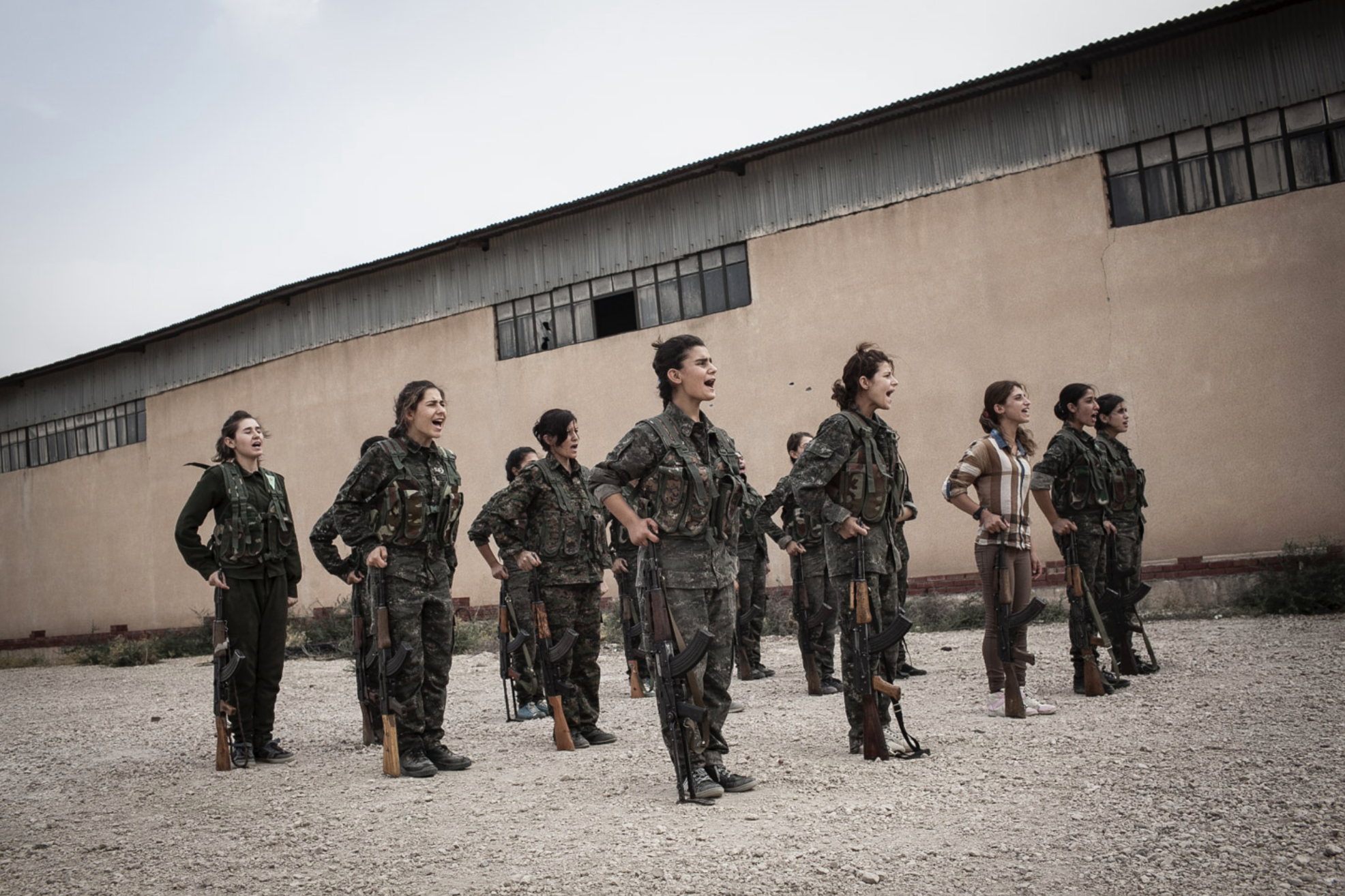
Young YPJ recruits participate in drills at dawn near Derek City, Syria. The YPJ schedule is demanding and discipline driven - new recruits get 6 hours of sleep and wake at 4 AM for physical training; afterwards, their day consists of drills and classroom lessons. Before joining the YPJ many of the girls had never participated in physical activity or exercise before.
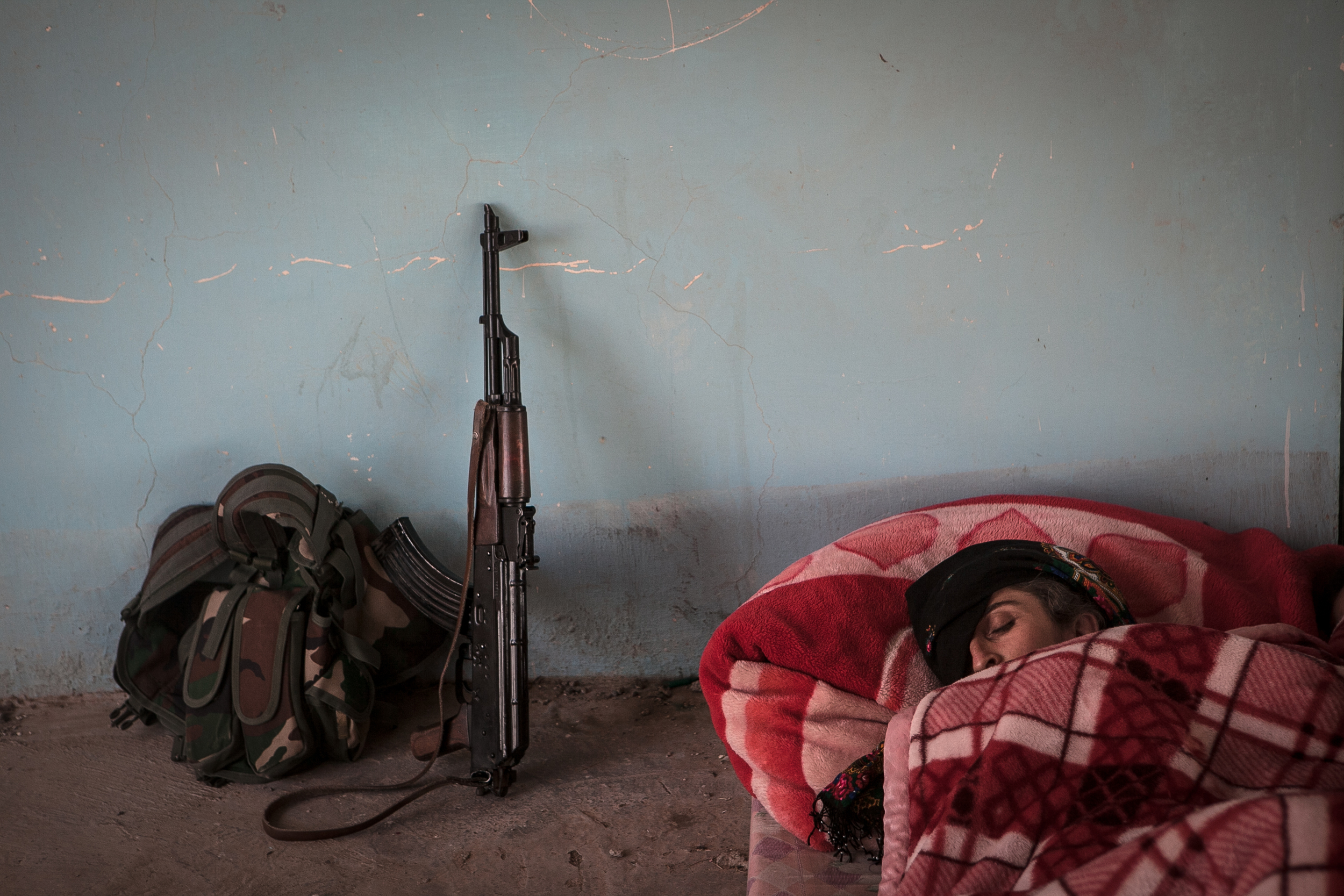
YPJ soldier Shavin Bachouk sleeps at an abandoned army post on the outskirts of Raabia, Iraq. Many YPG / YPJ soldier stake out at on the Syrian-Iraq border to fend of ISIS attacks.
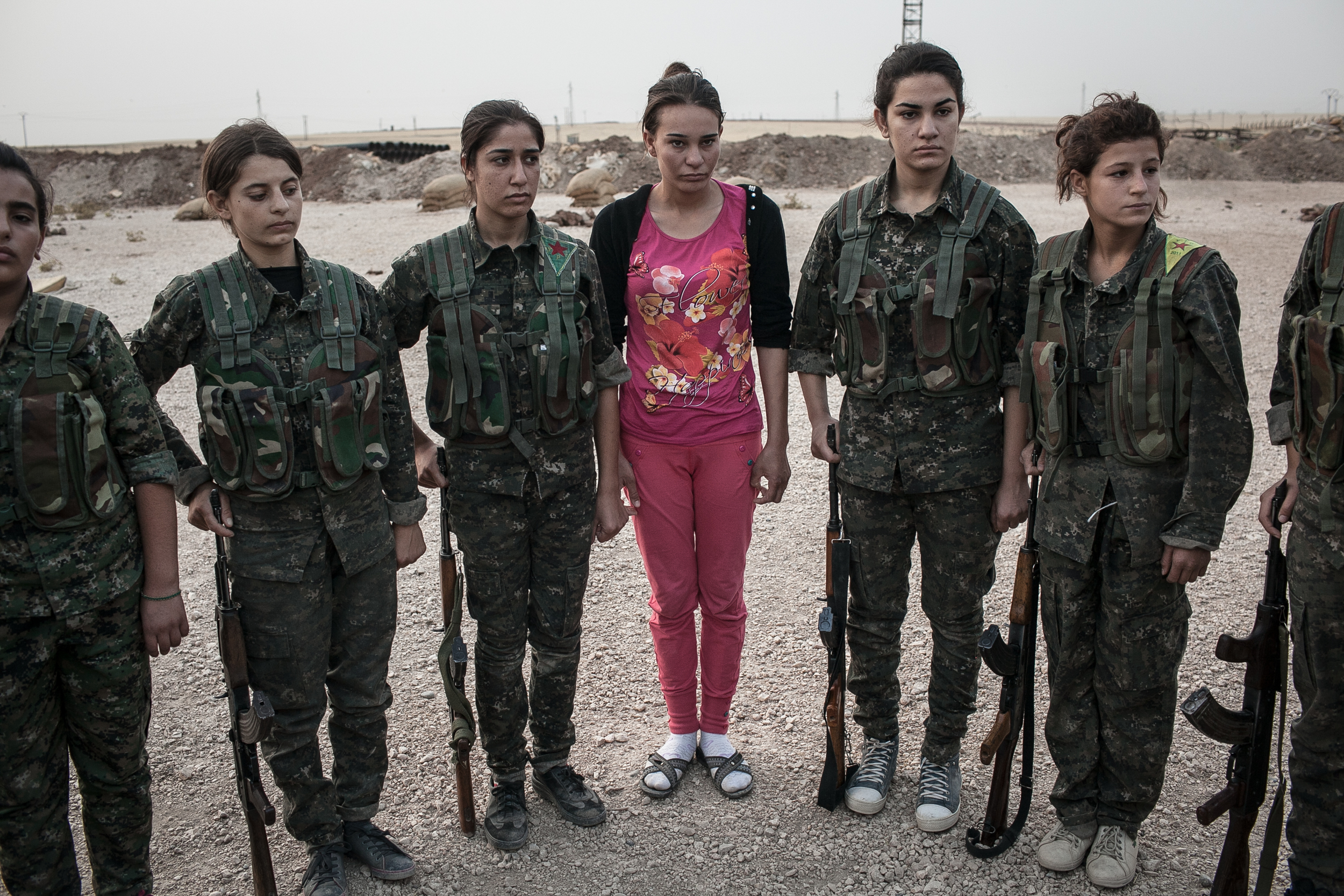
A young YPJ recruit, center, arrives on her first day to the YPJ training base near Derek City, Syria.
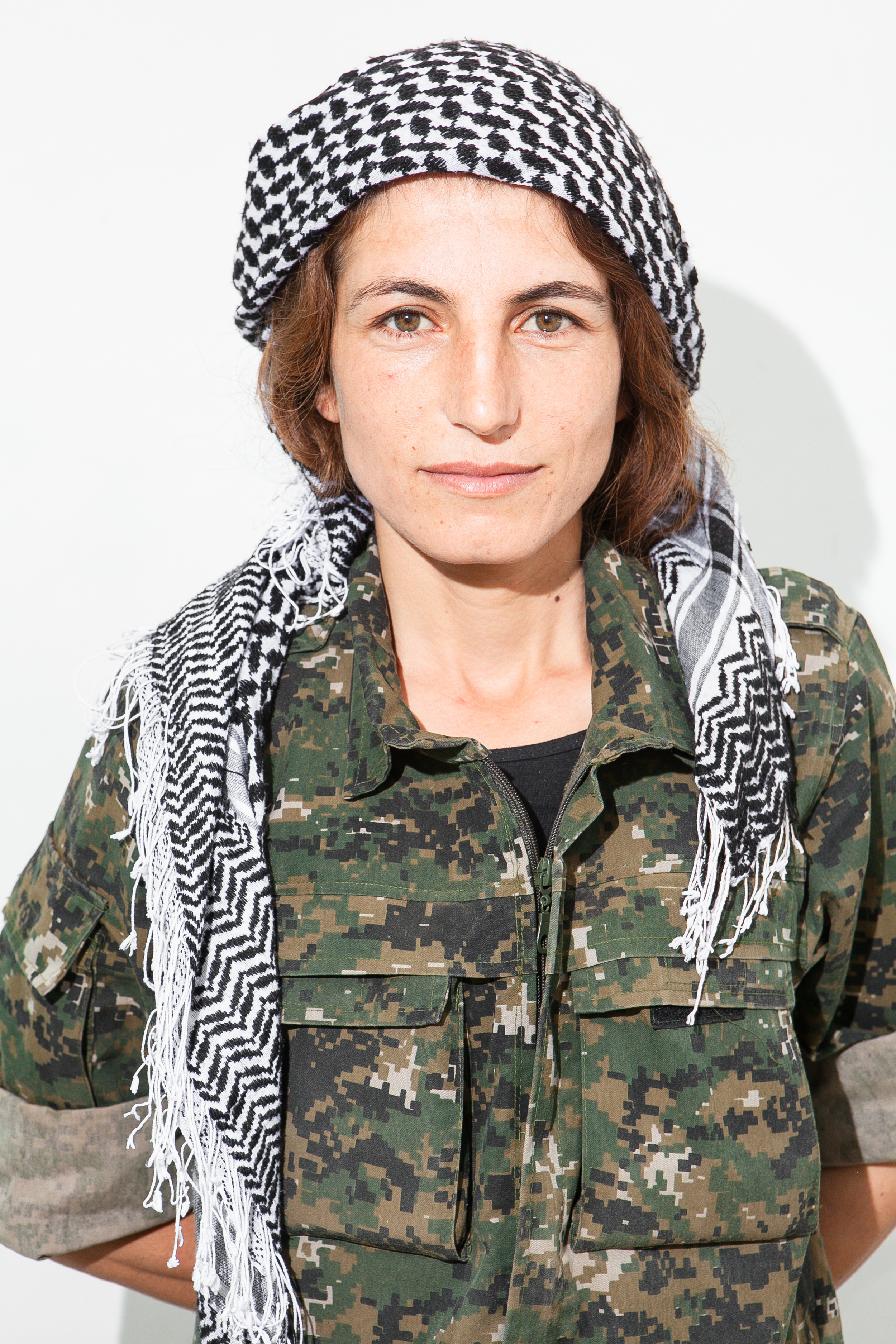
Evin Ahmed, 28.
"We defend everyone in Rojava no matter what race or religion they are. We are very strong women, we aren’t afraid of anything. I love being a YPJ soldier, I love the other soldiers, we are closer than sisters. This is the only life for me. I can’t imagine living any other way.”
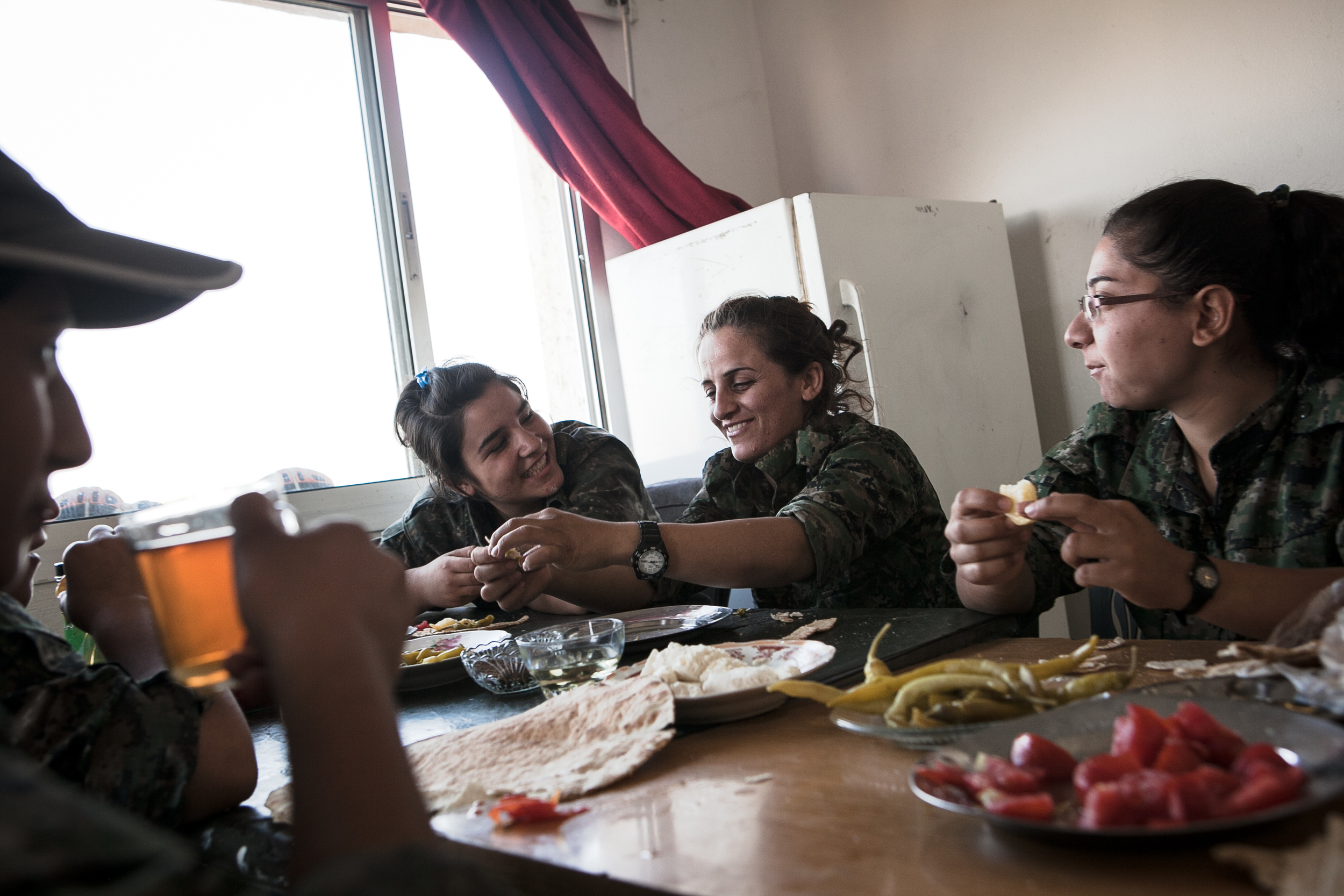
YPJ soldiers have breakfast at their military post near the Syrian-Iraq border in Til Kocer, Syria. YPJ meals are modest since most of their supplies and food are donated from local community members.
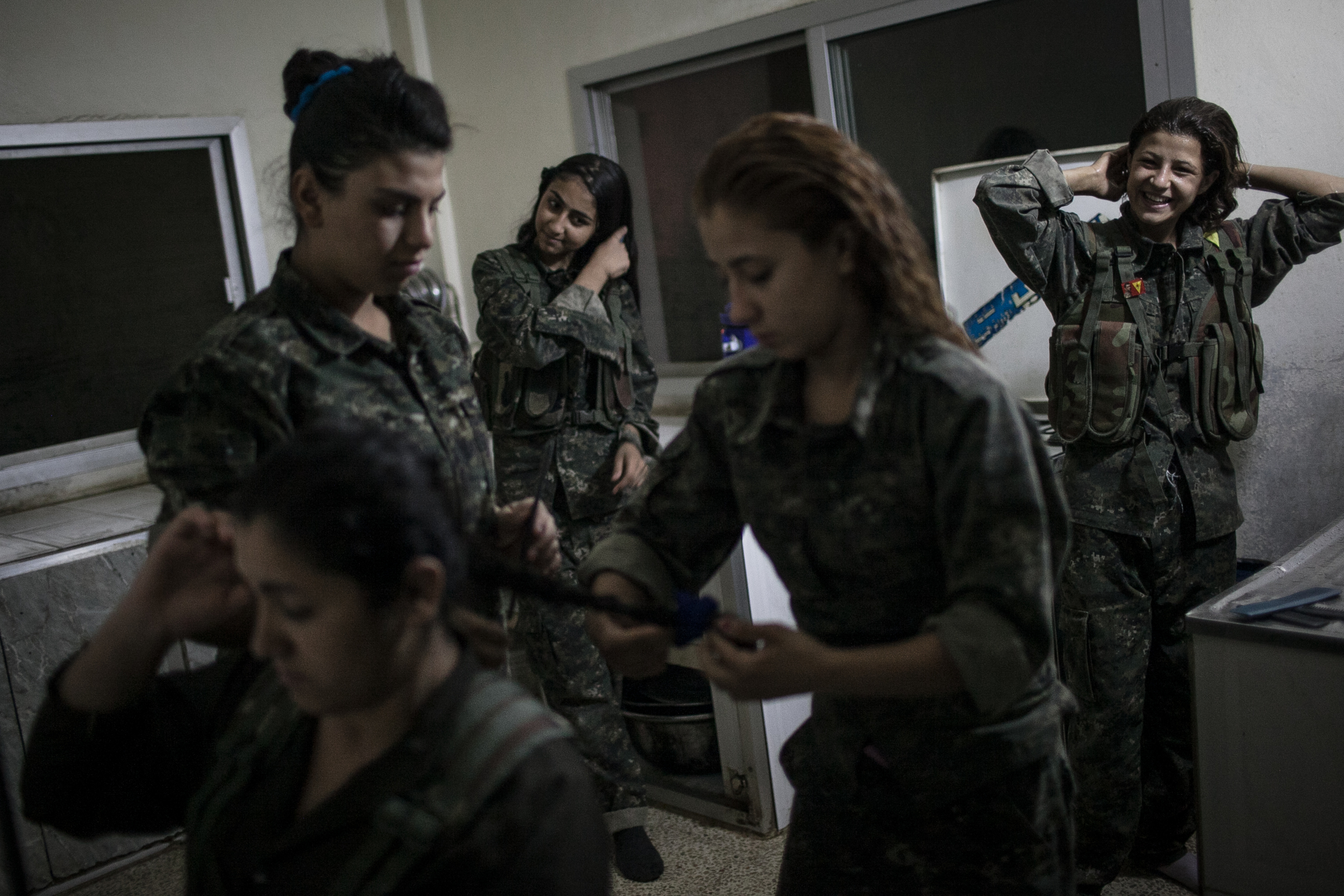
Young YPJ recruits fix their hair at 4:30 AM before training drills near Derek City, Syria.
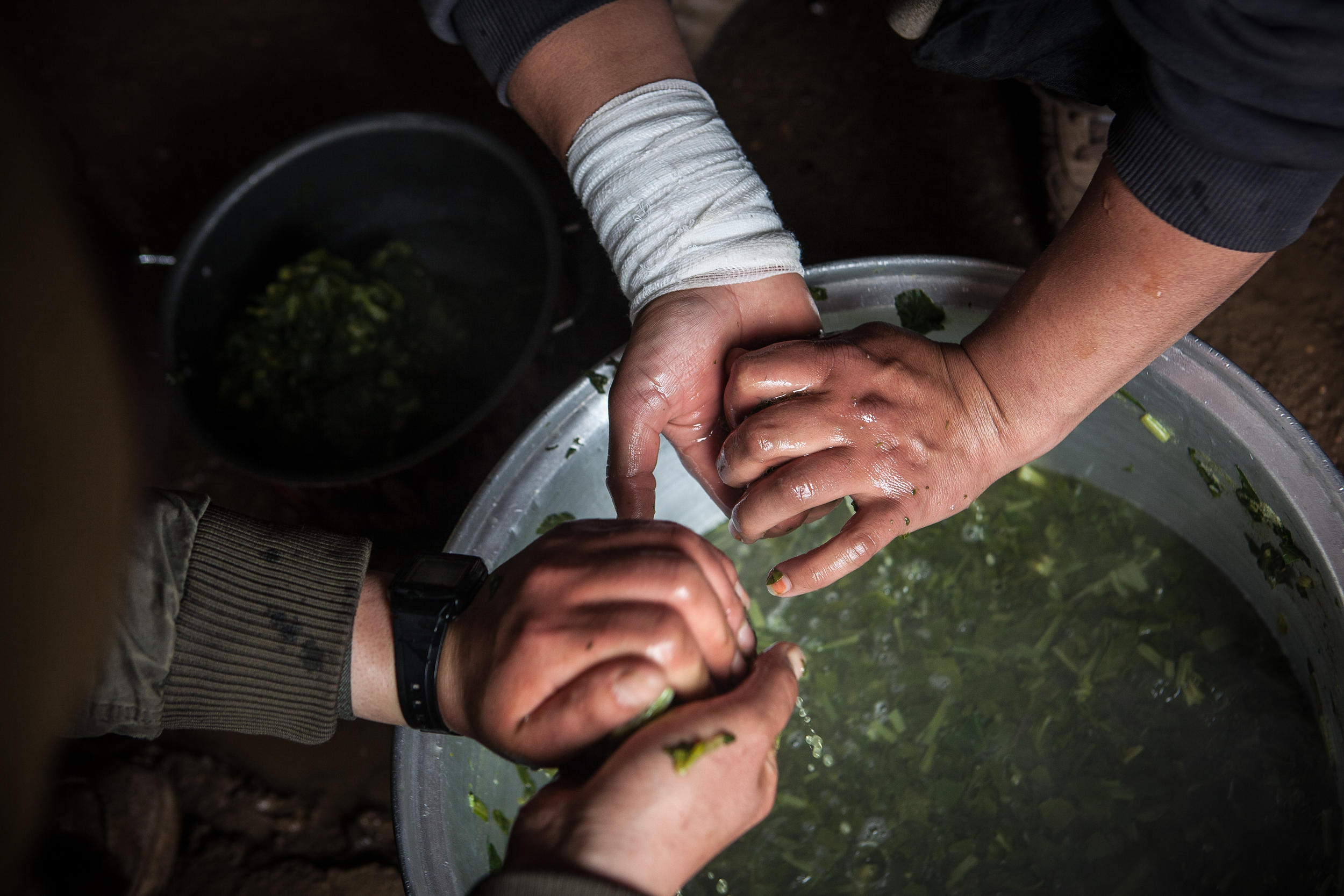
YPJ soldiers cook dinner at their base near Sinjar, Iraq.
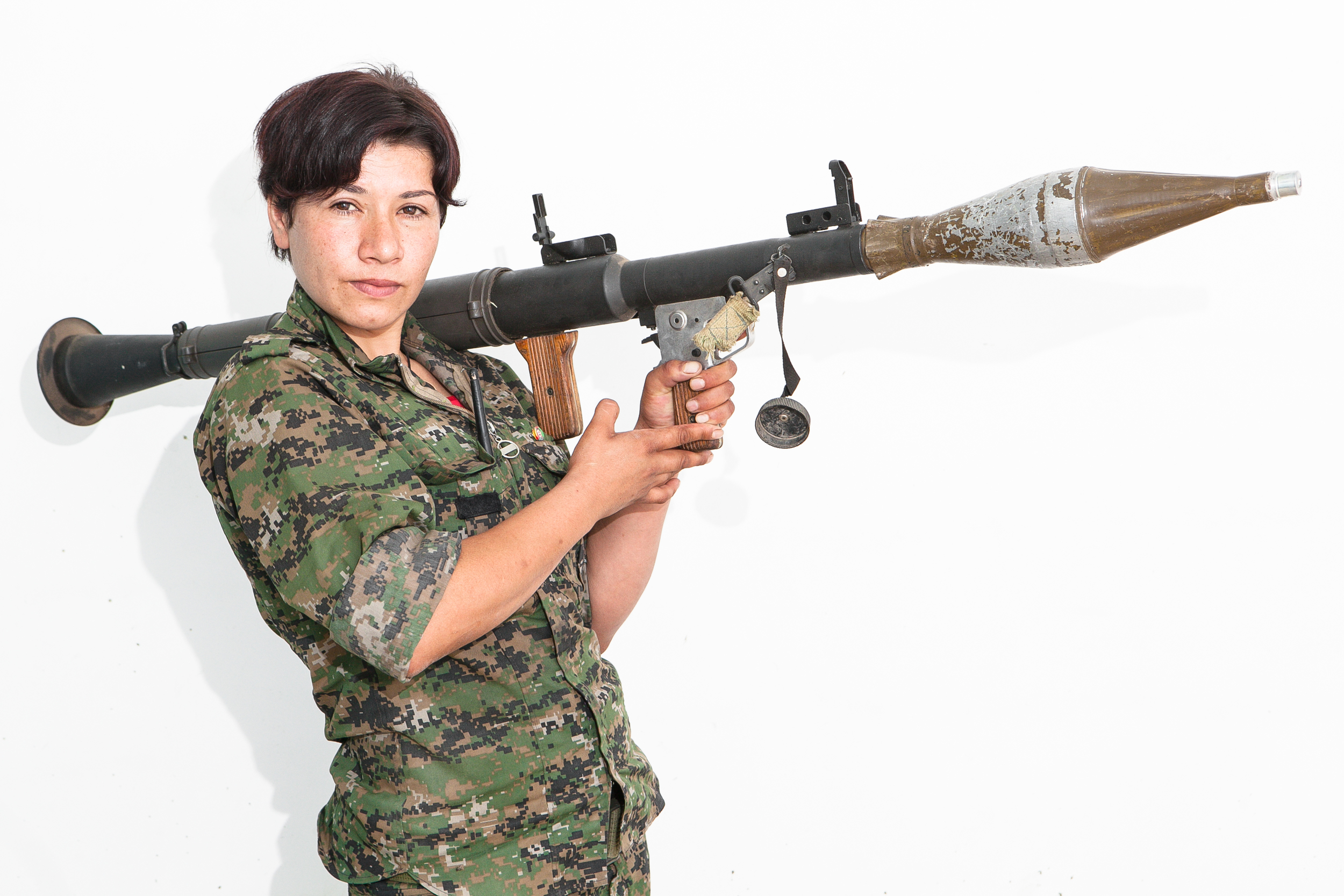
Hasrat Sahad, 23; photographed on the outskirts of Raabia, Iraq.
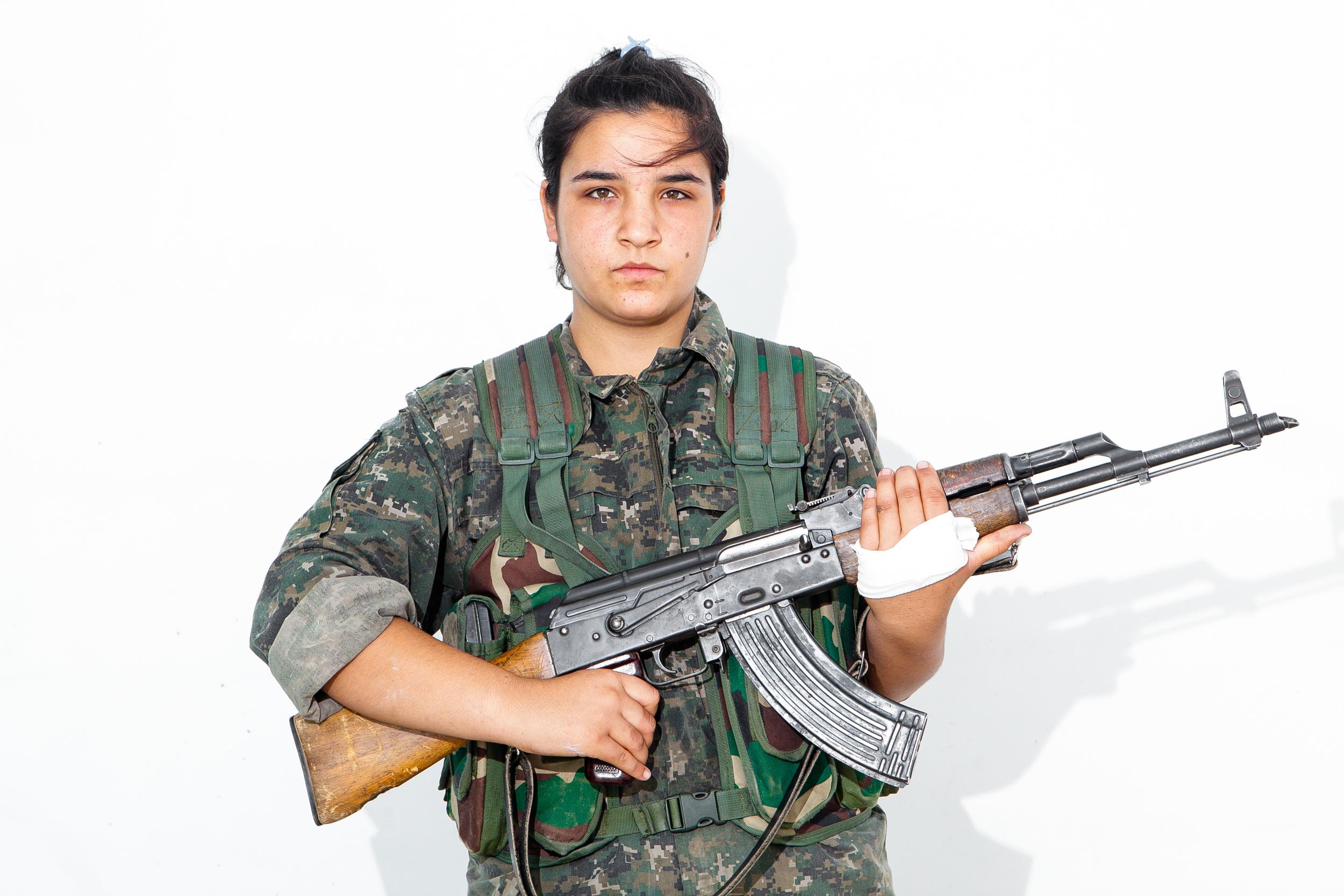
Zevin Botan, 20; photographed on the outskirts of Raabia, Iraq.
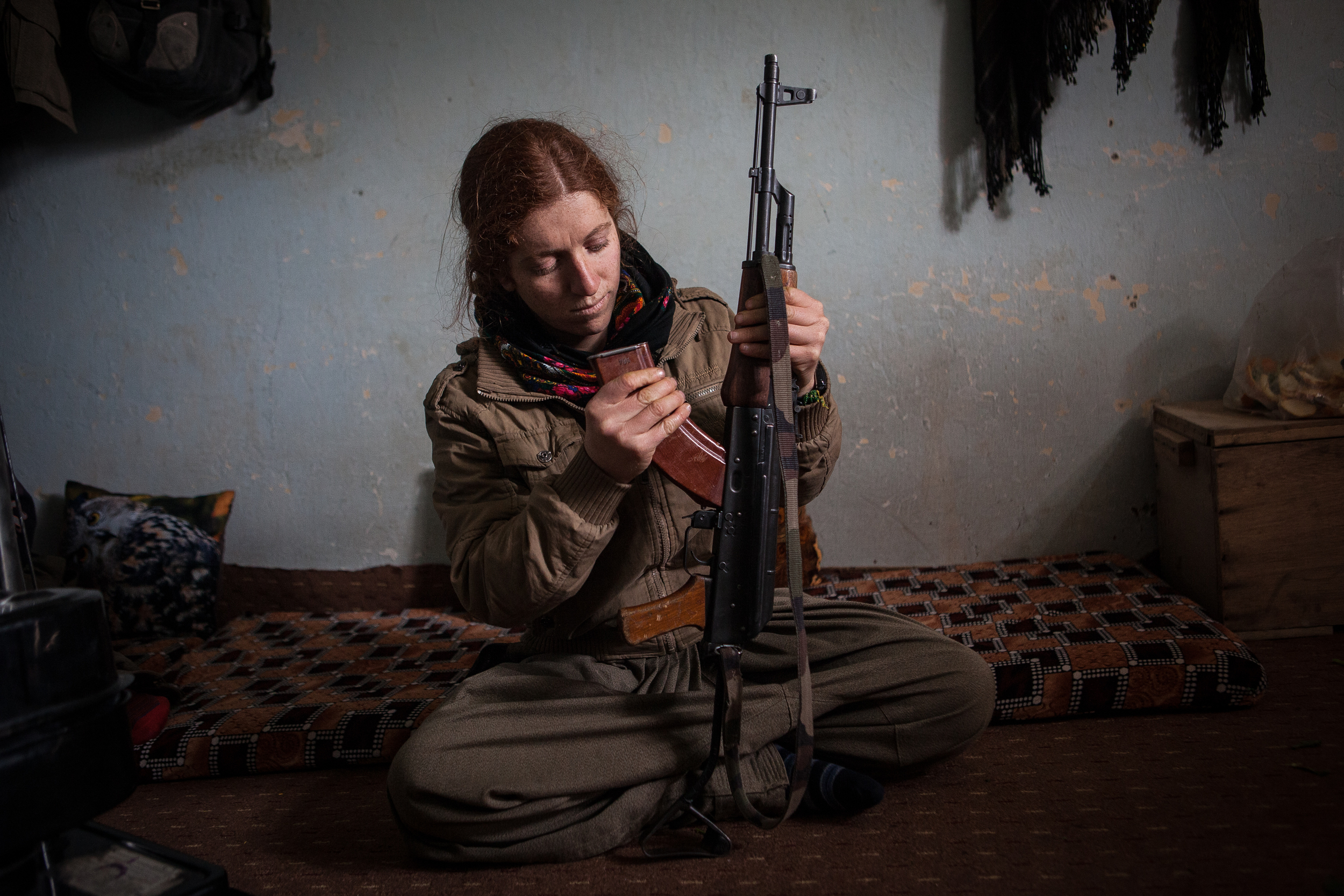
PKK guerrilla Zin Roken, 24. When ISIS attacked Sinjar in 2014, killing and capturing thousands of Yazidis (an ethnic and religious minority in Iraq) while additional tens of thousands were forced to flee, the PKK guerrillas took up arms to defend the Yazidis and their homeland.
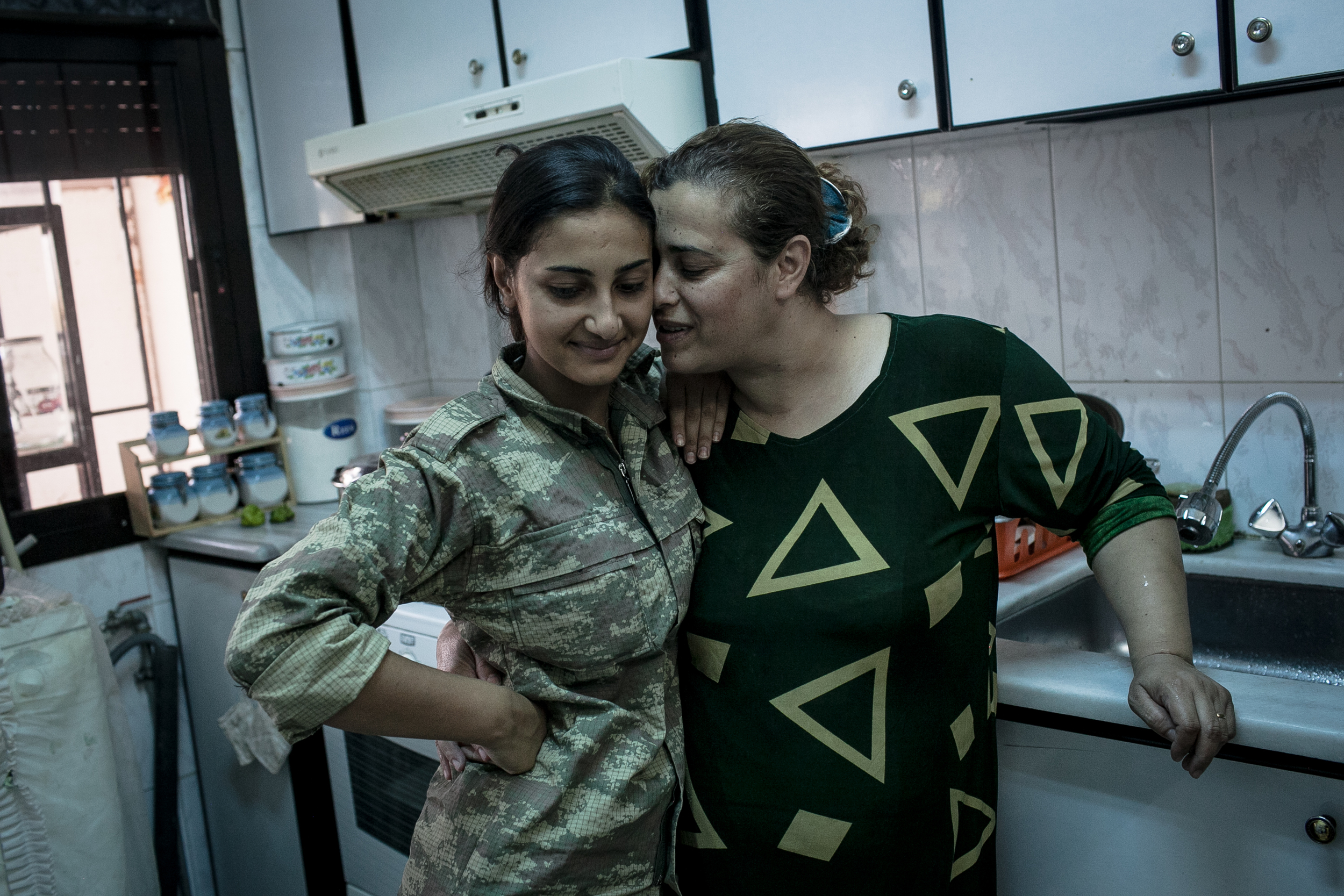
Jin, left, a YPJ soldier, is hugged by her mother, Amina, at their home in Girke Lege, Syria. Although she lives at a YPJ base near her mother’s home, Jin had not seen her mother in months because of the YPJ’s demanding training schedule.
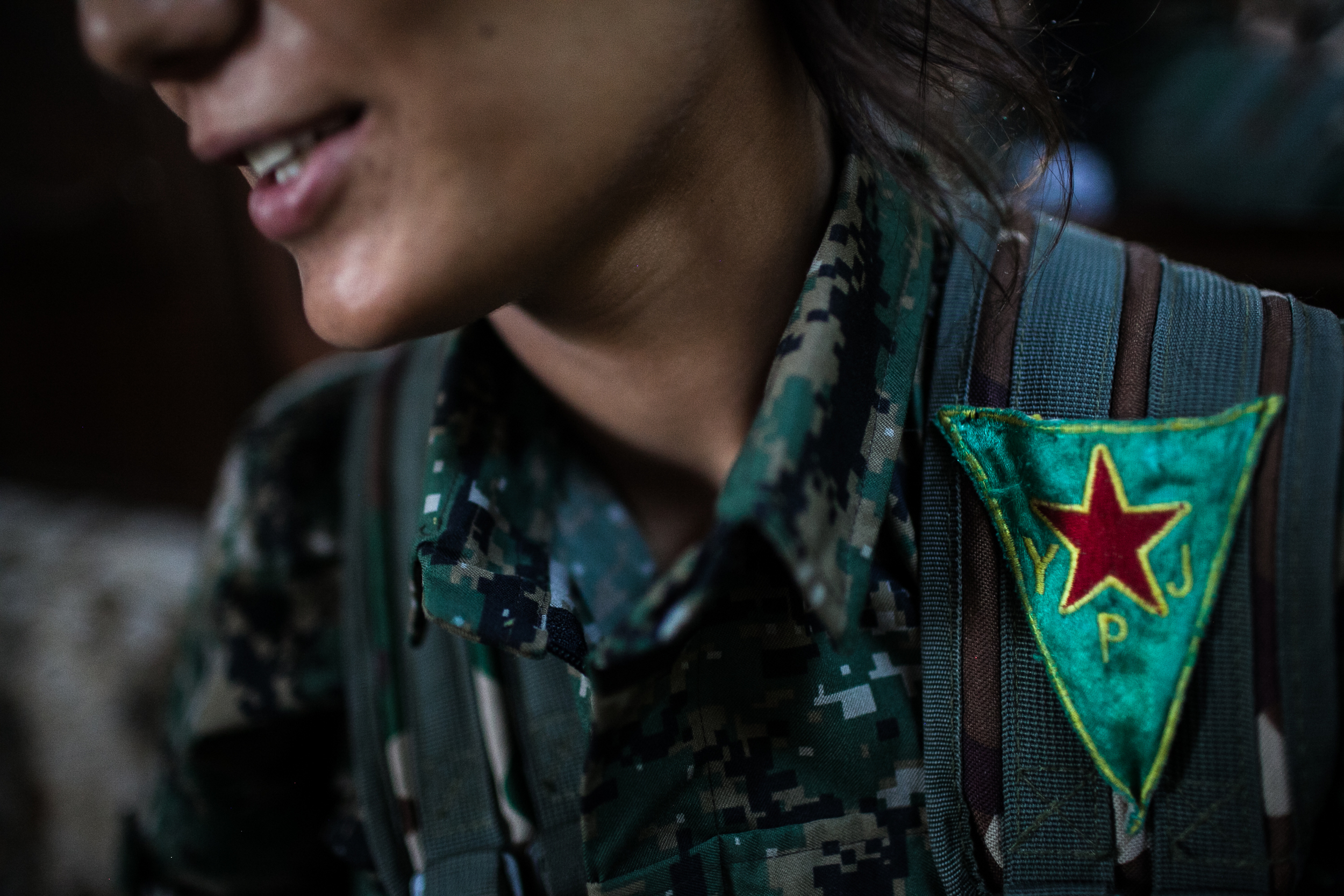
YPJ soldier, Amara, wears a red, yellow and green patch, the official flag of the YPJ, on her uniform near Girke Lege, Syria.
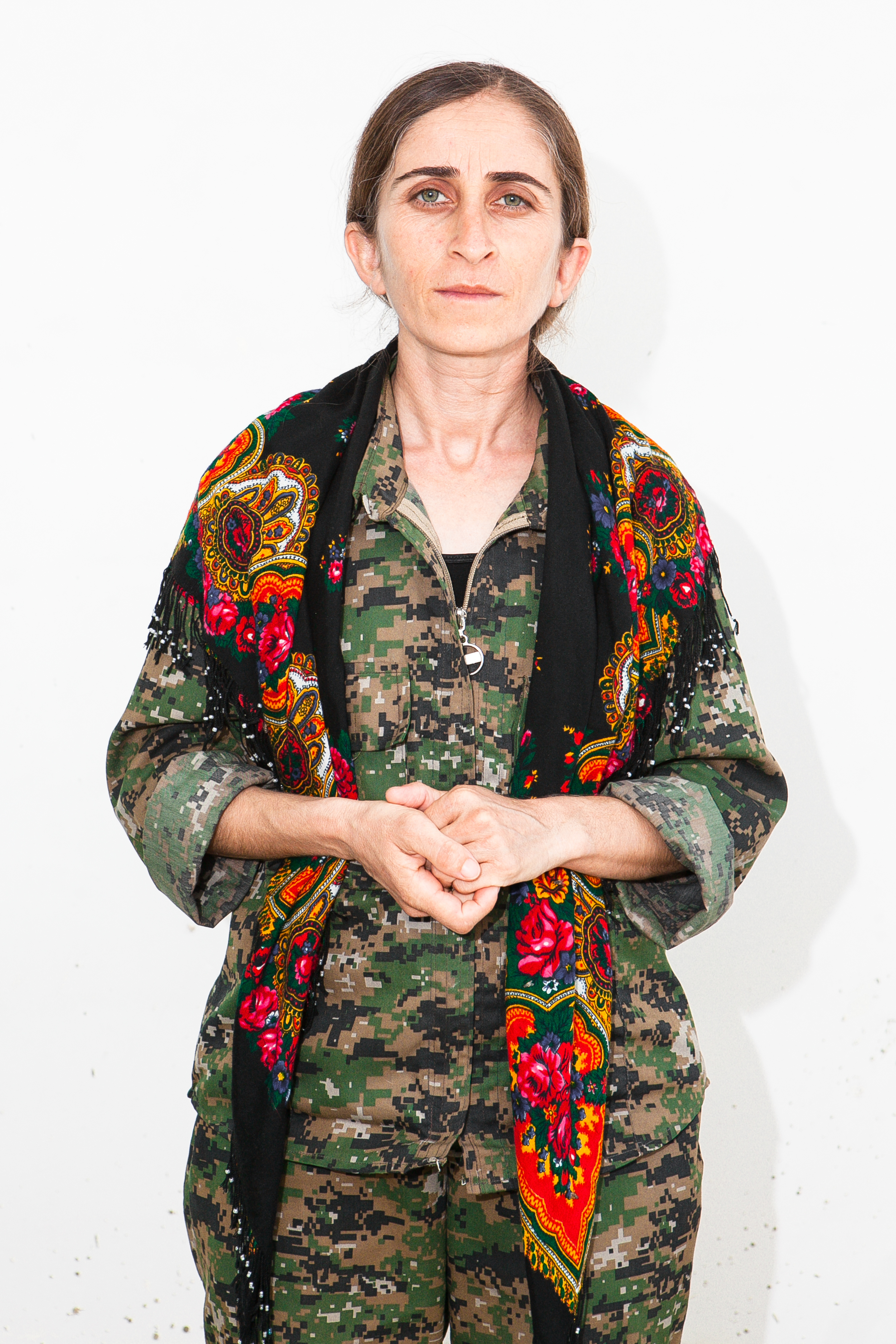
Shavin Bachouk, 26; photographed on the outskirts of Raabia, Iraq.
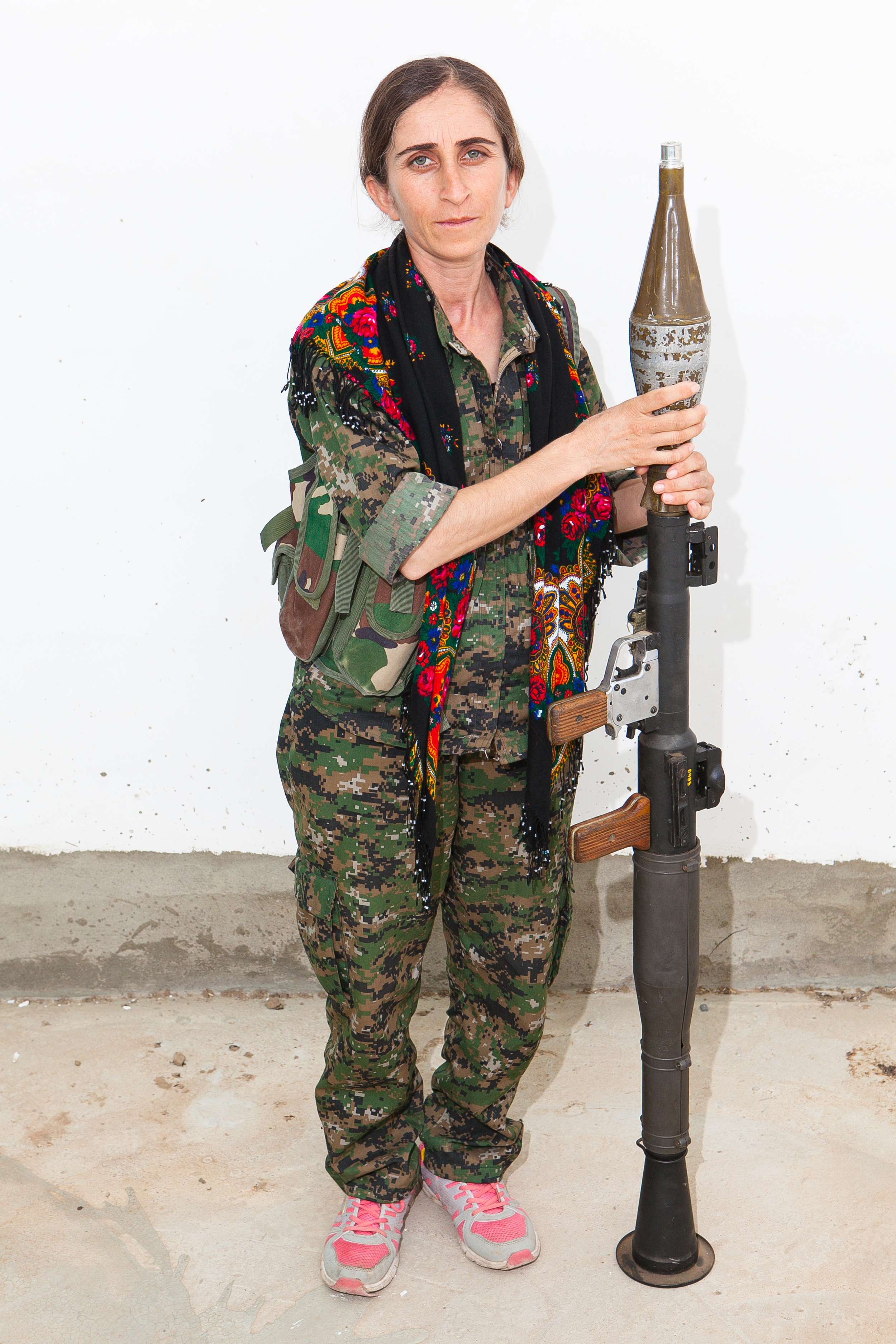
Shavin Bachouk, 26; photographed on the outskirts of Raabia, Iraq.
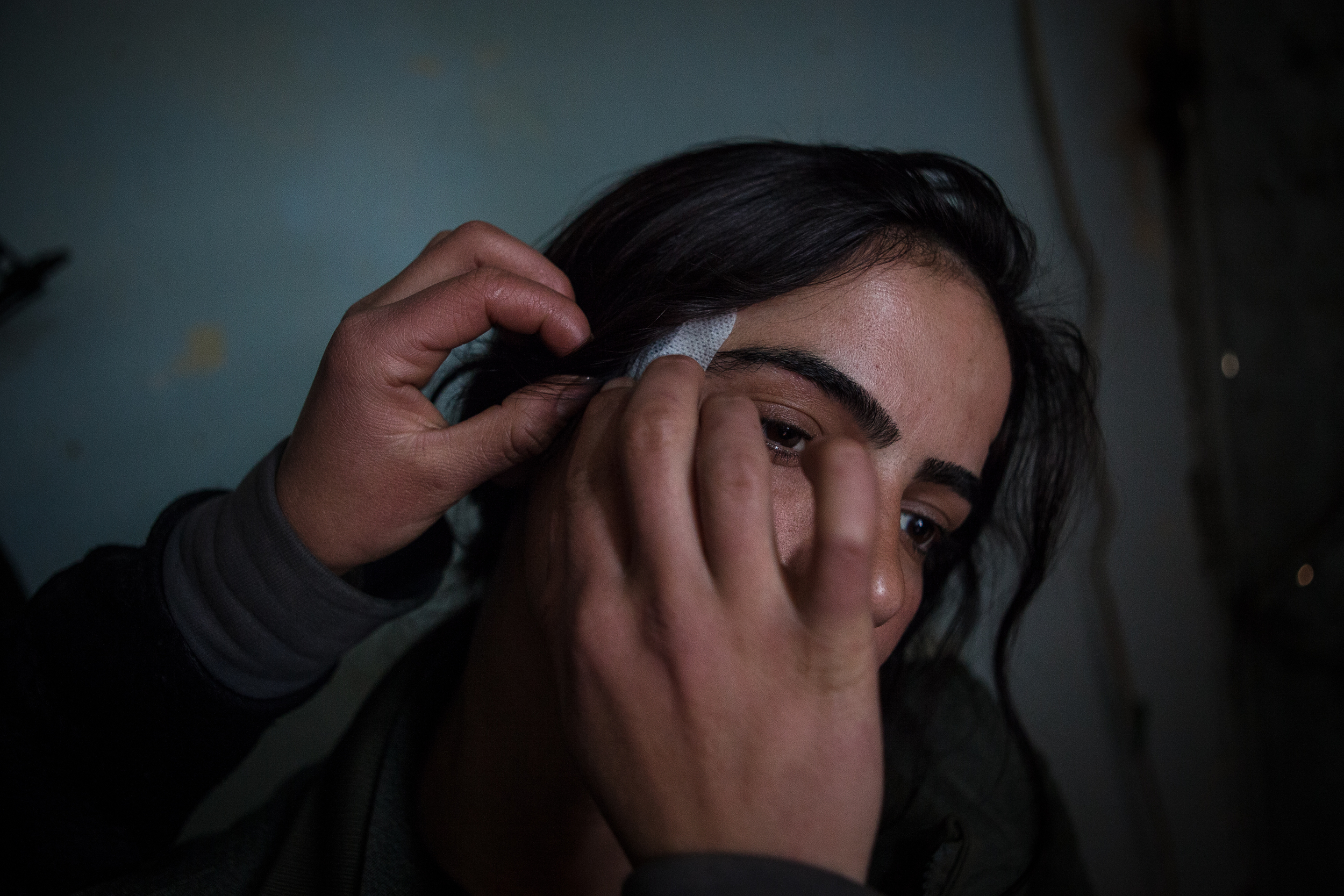
A PKK guerrilla is bandaged after being wounded by shrapnel while fighting ISIS militants in Sinjar, Iraq.
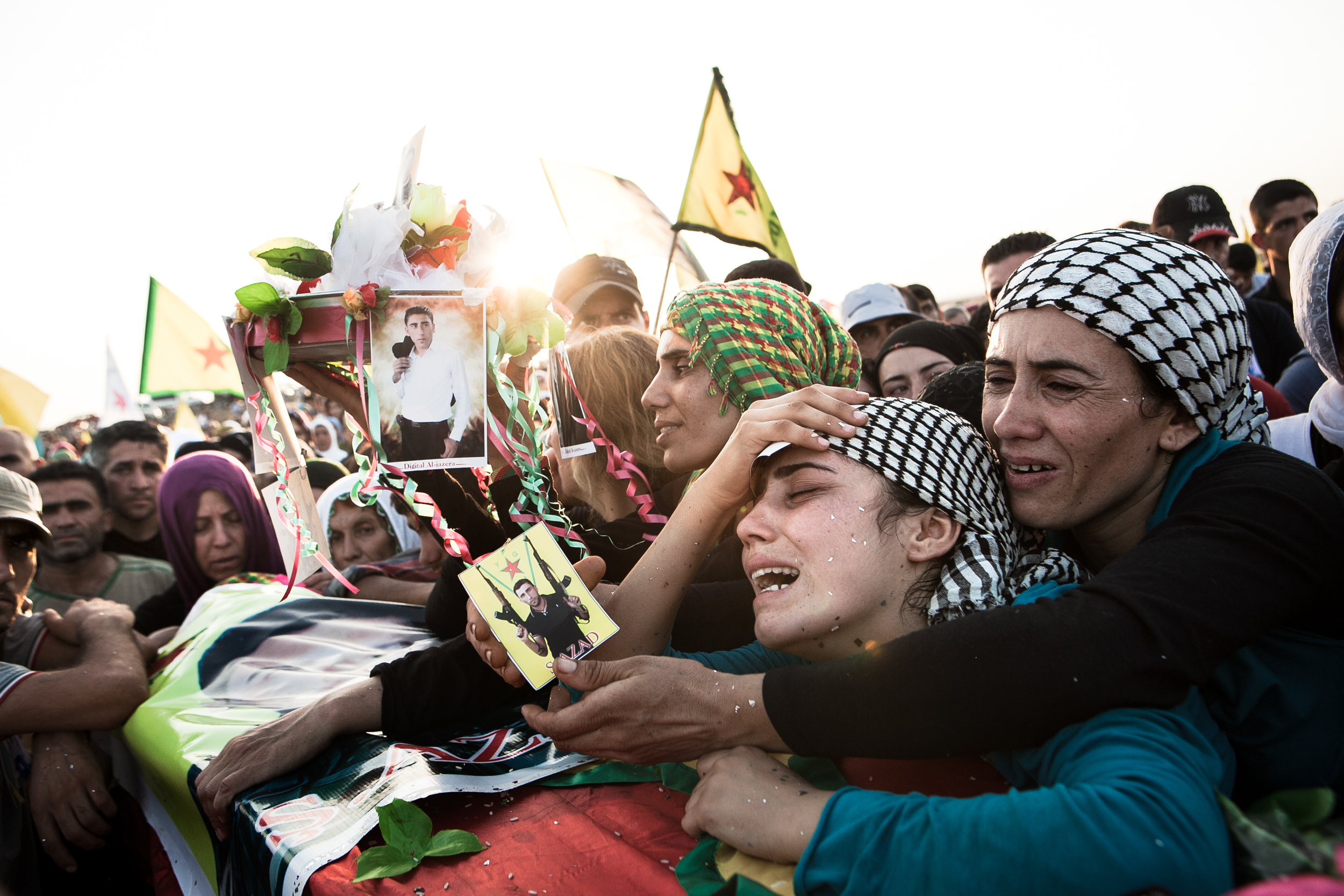
A family mourns for a YPG soldier who was killed in action while fighting against ISIS along the Syrian-Iraq border.
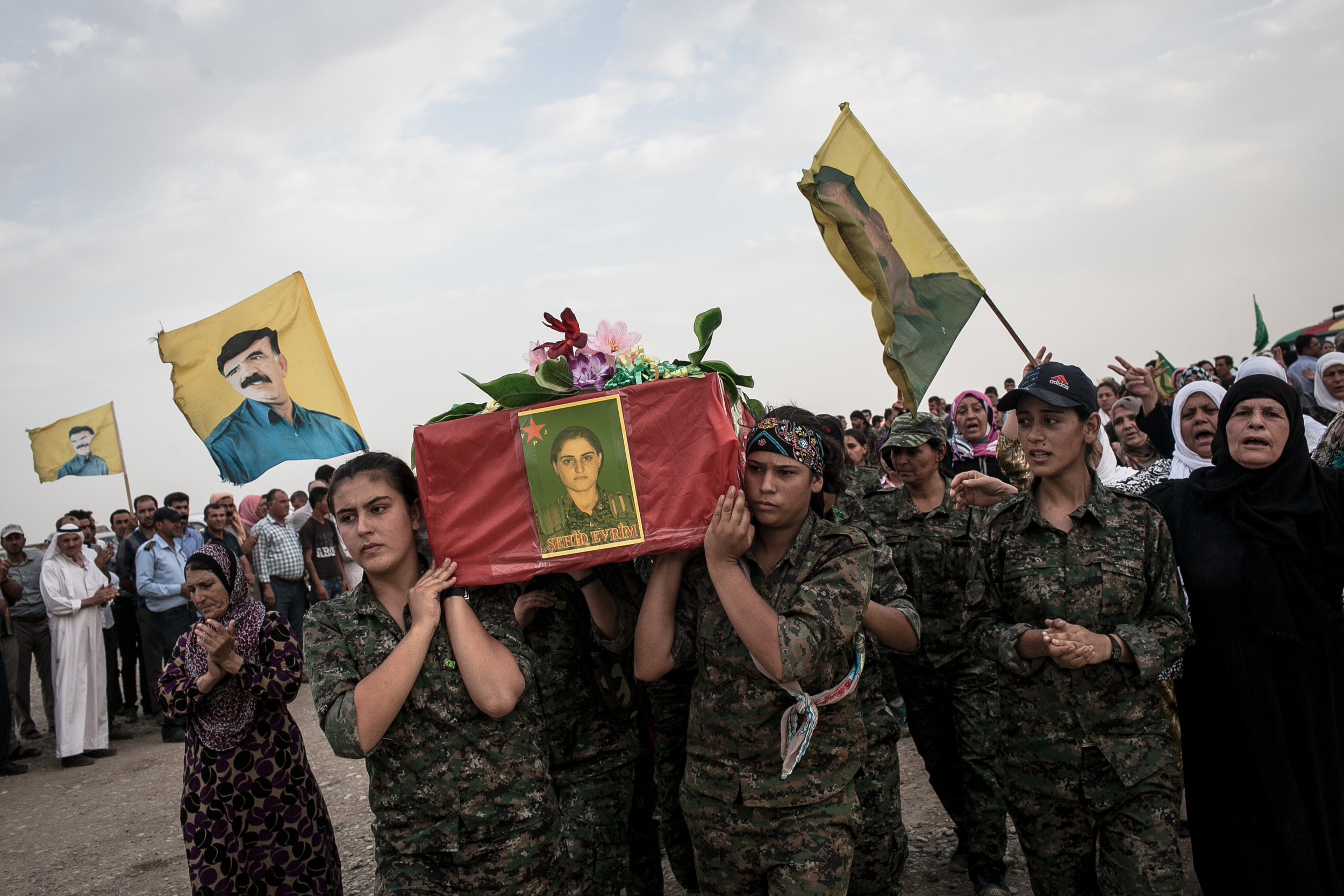
YPJ members carry the coffin of a fellow soldier who was killed by ISIS at a funeral along the Syrian-Iraq border.
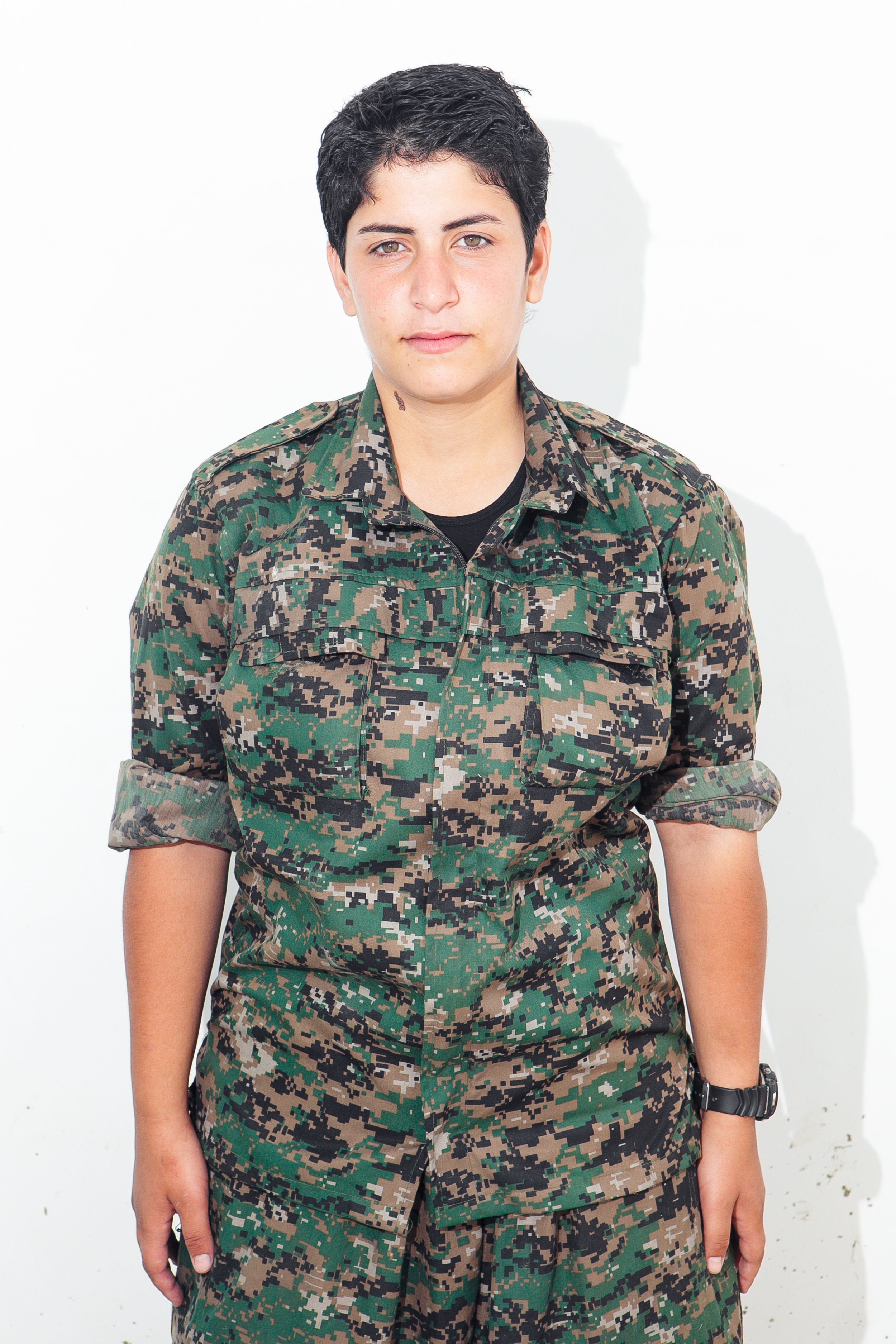
Narlene, 20; photographed on the outskirts of Raabia, Iraq.
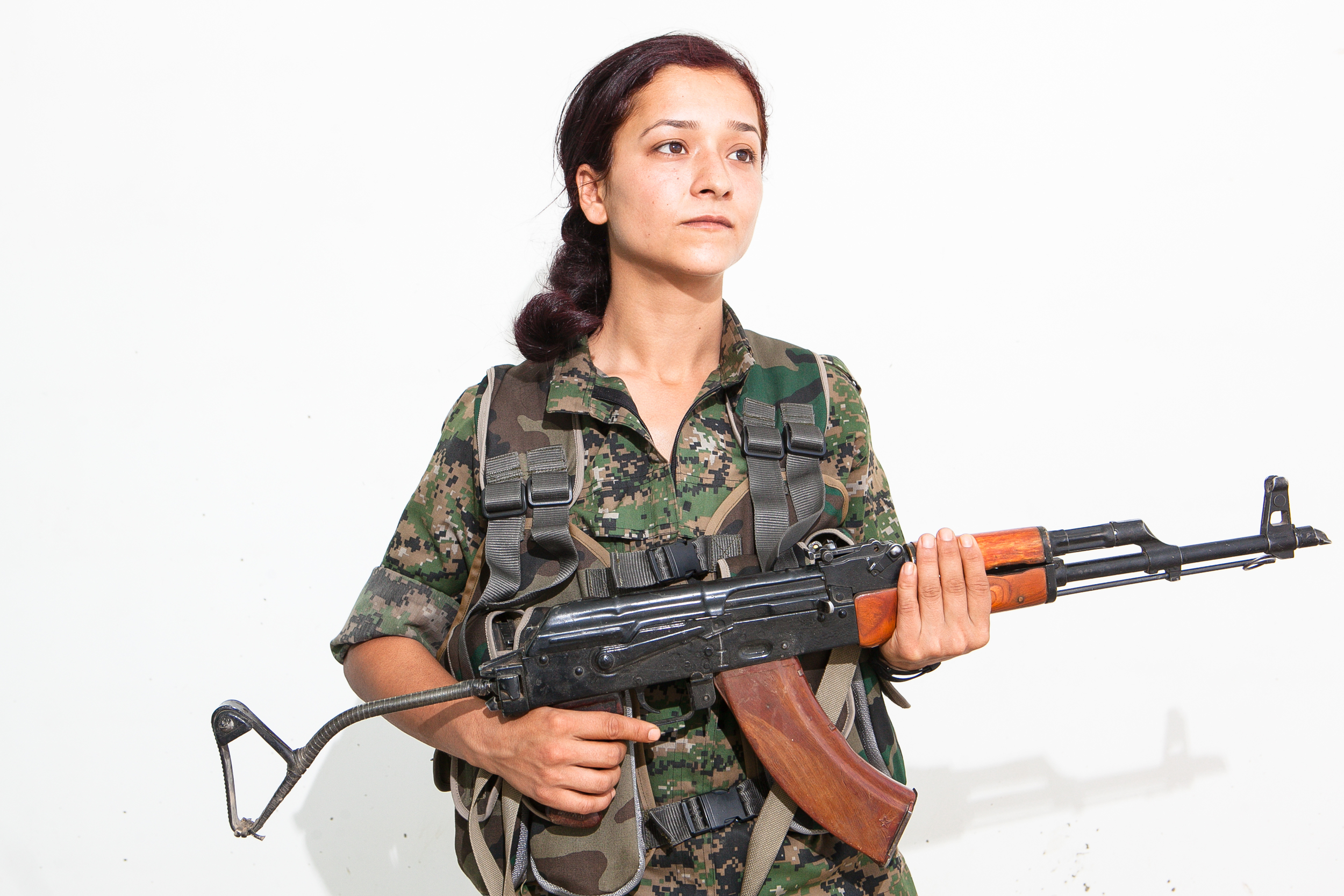
Avinar Kolcer, 26; photographed on the outskirts of Raabia, Iraq.
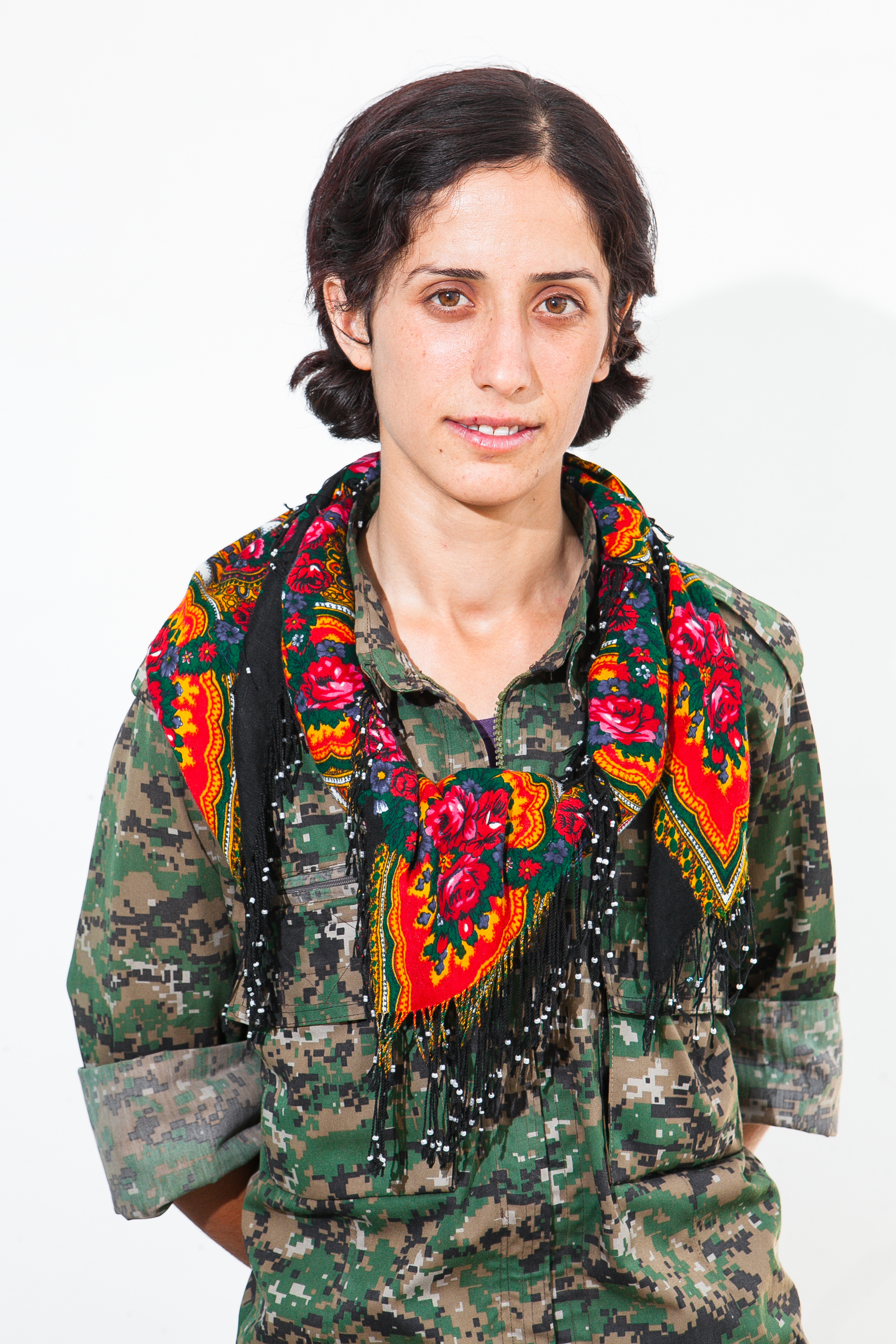
Mizguin Ronahi; photographed on the outskirts of Raabia, Iraq.
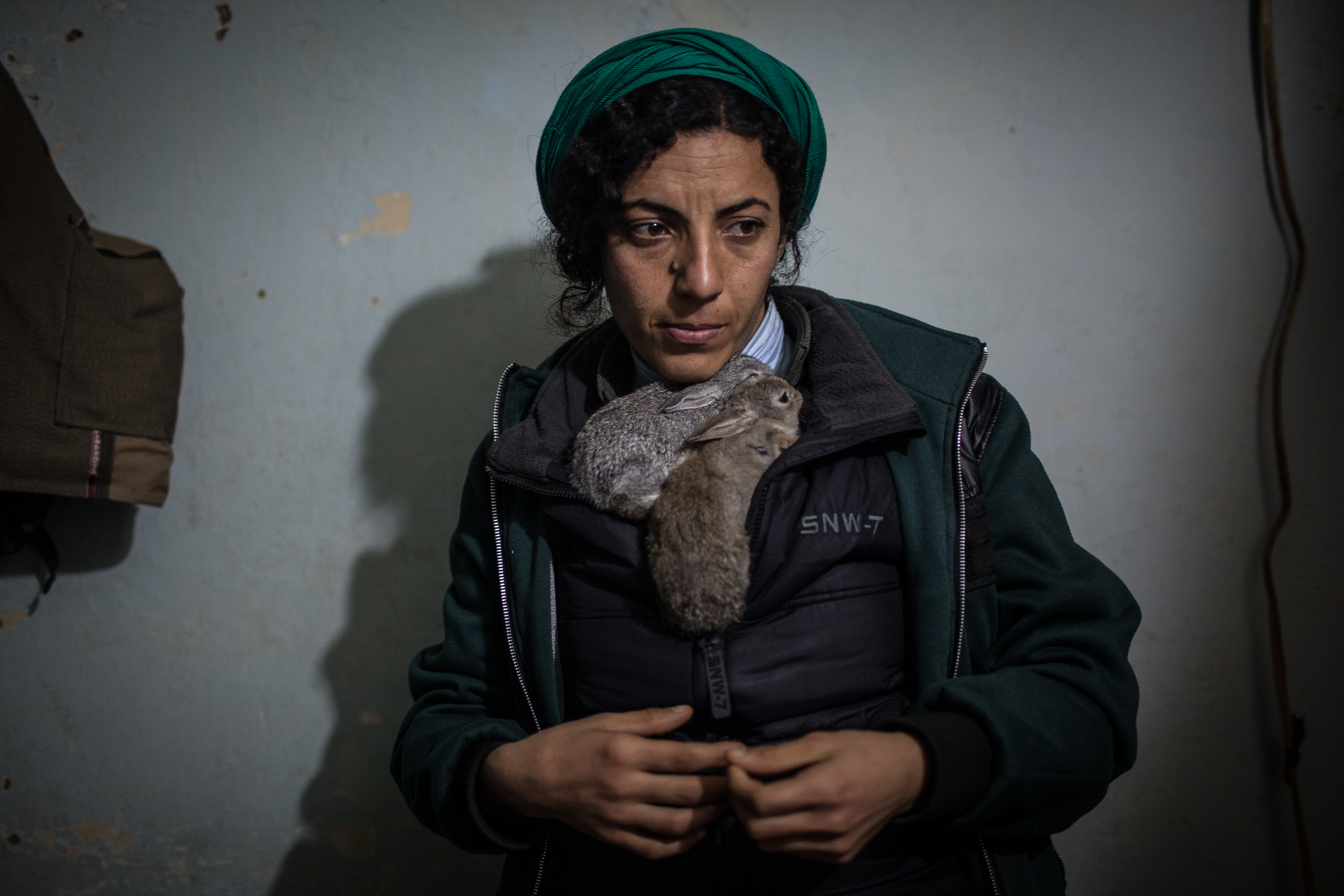
A YPJ Soldier cradles two pet bunnies, Sinjar, Iraq.

Nuhad Kocer, 29, sits near the television; on the left, a doll nicknamed "Azadi", in Til Kocer, Syria. "Azadi the doll" was named after YPJ soldier Azadi Ristem, pictured in the photo frame on the left, who was killed by sniper fire by Jibhad L'Nasra, a faction group of Al Quaeda.
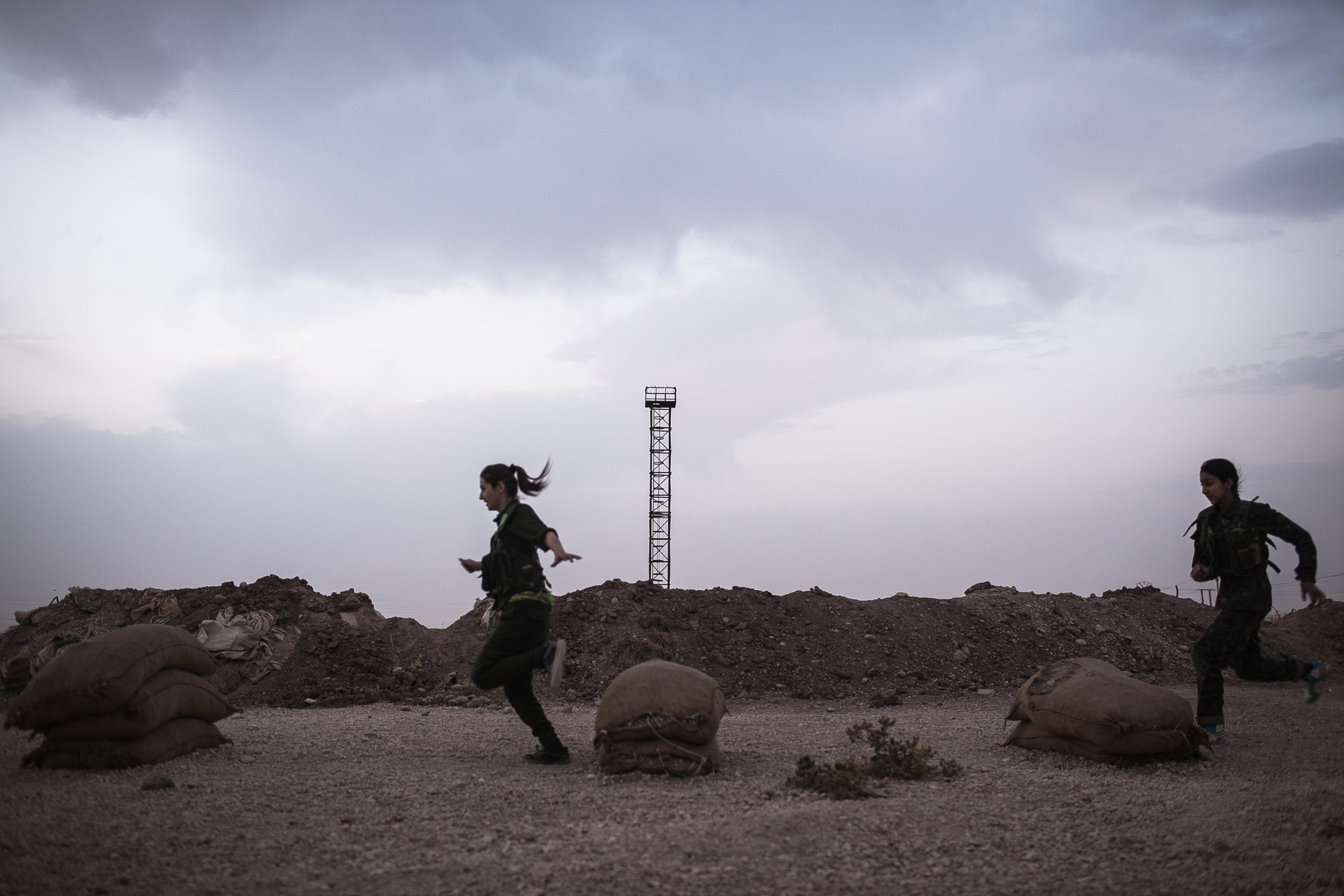
YPJ recruits exercise at dawn, near Derek City, Syria.
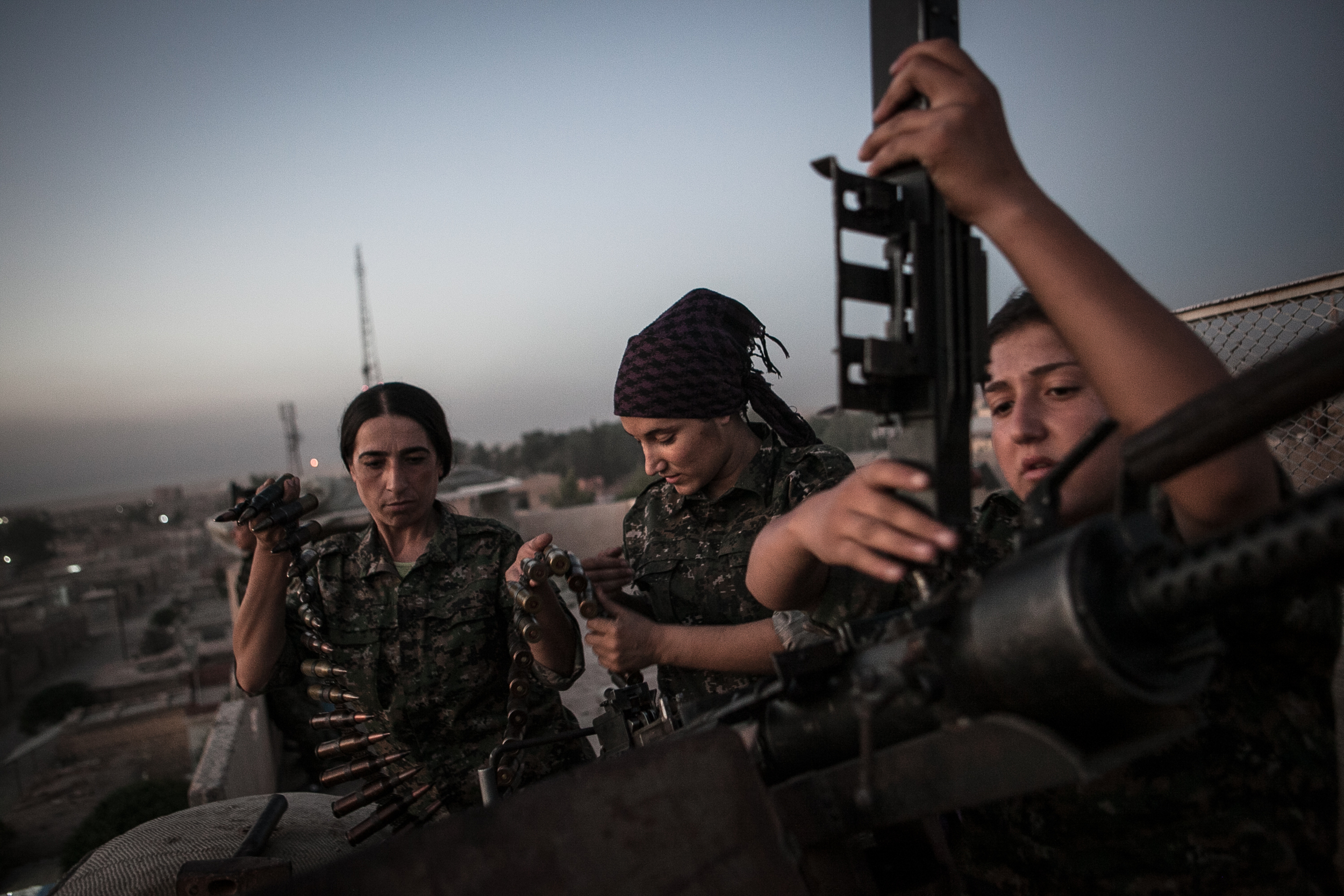
Captain Ronahi Anduk, 34, left, Gian Dirik, center, and Dirsim Judi, 18, right, fix the DShK weapon at a YPJ military base in Til Kocer, Syria. The DShK weapon is a Soviet machine gun typically used as an anti-aircraft wepaon, but the YPJ use it to fight ISIS.
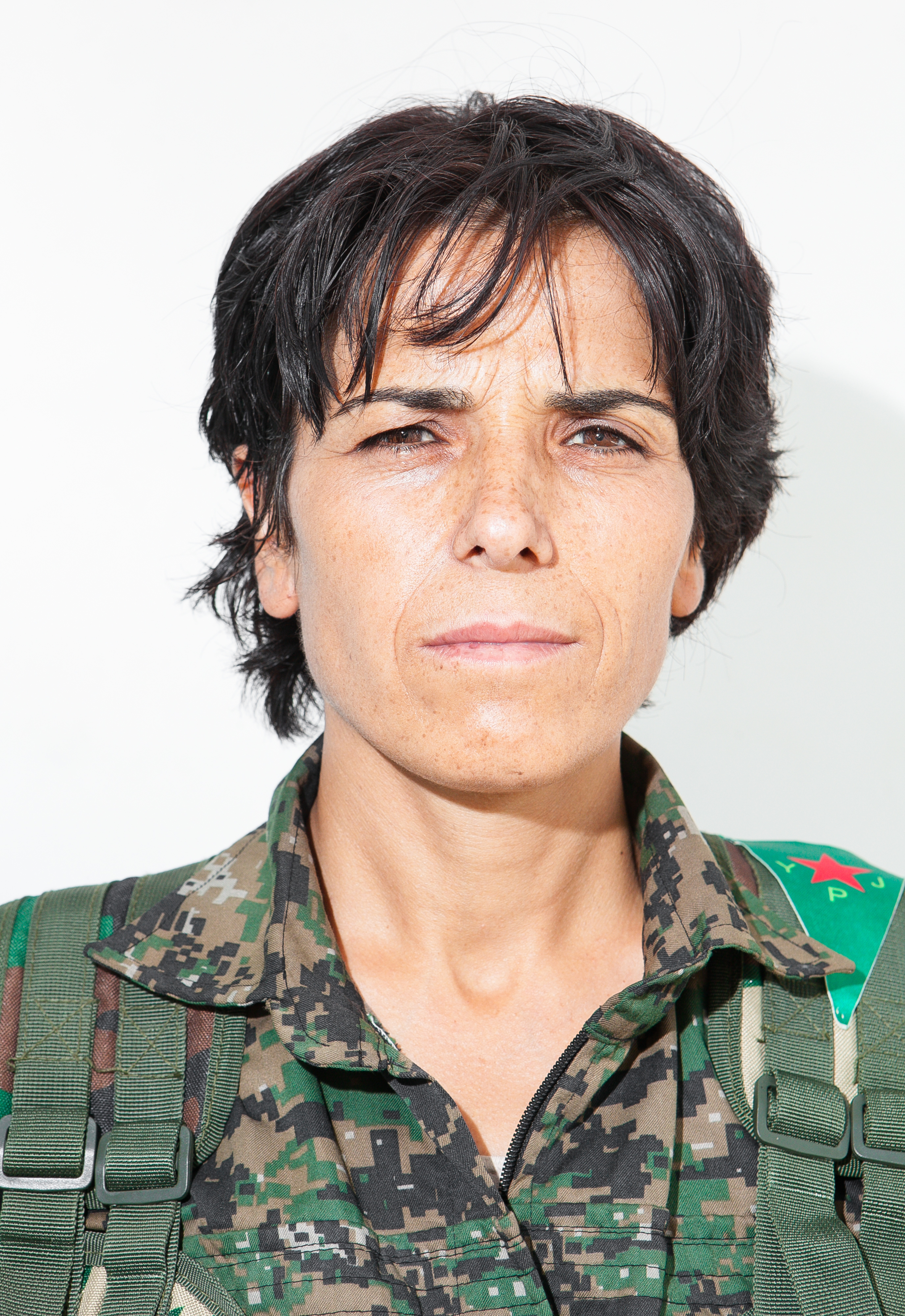
General Zelal, 33; photographed on the outskirts of Raabia, Iraq.
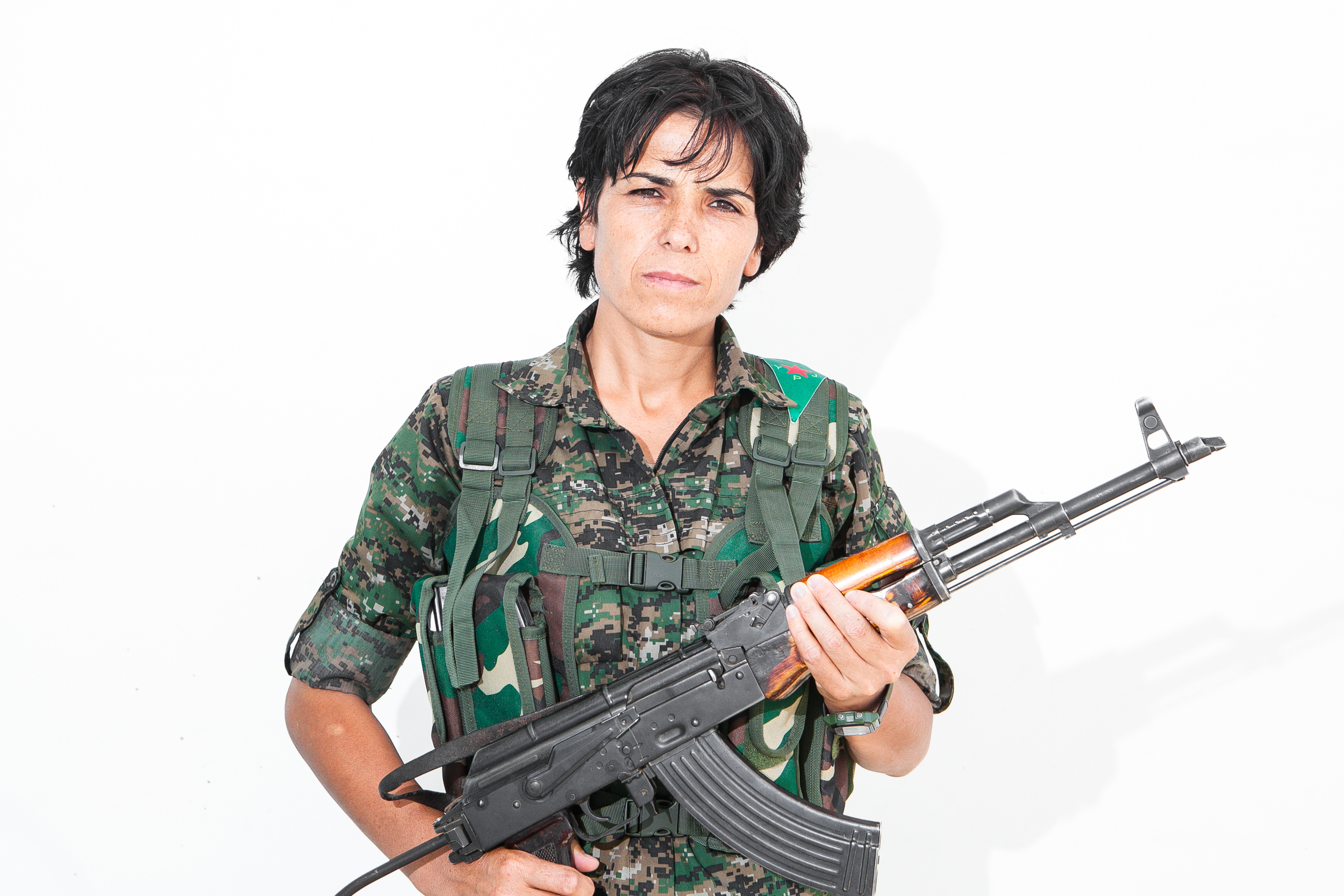
General Zelal, 33; photographed on the outskirts of Raabia, Iraq.
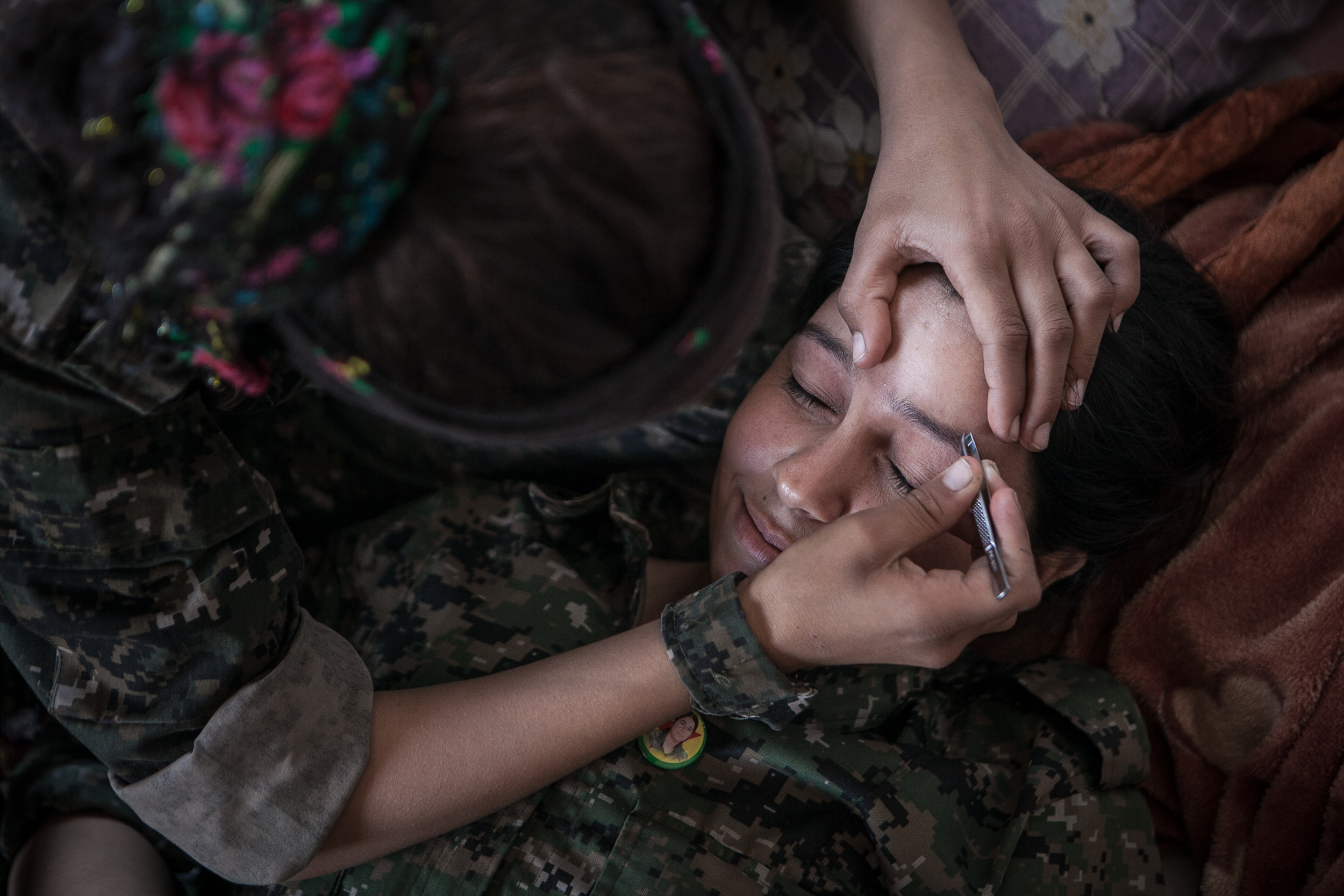
Azadi Qamishlo, 22, has her eyebrows plucked by a fellow soldier at a YPJ military base in the town of Til Kocer, Syria.
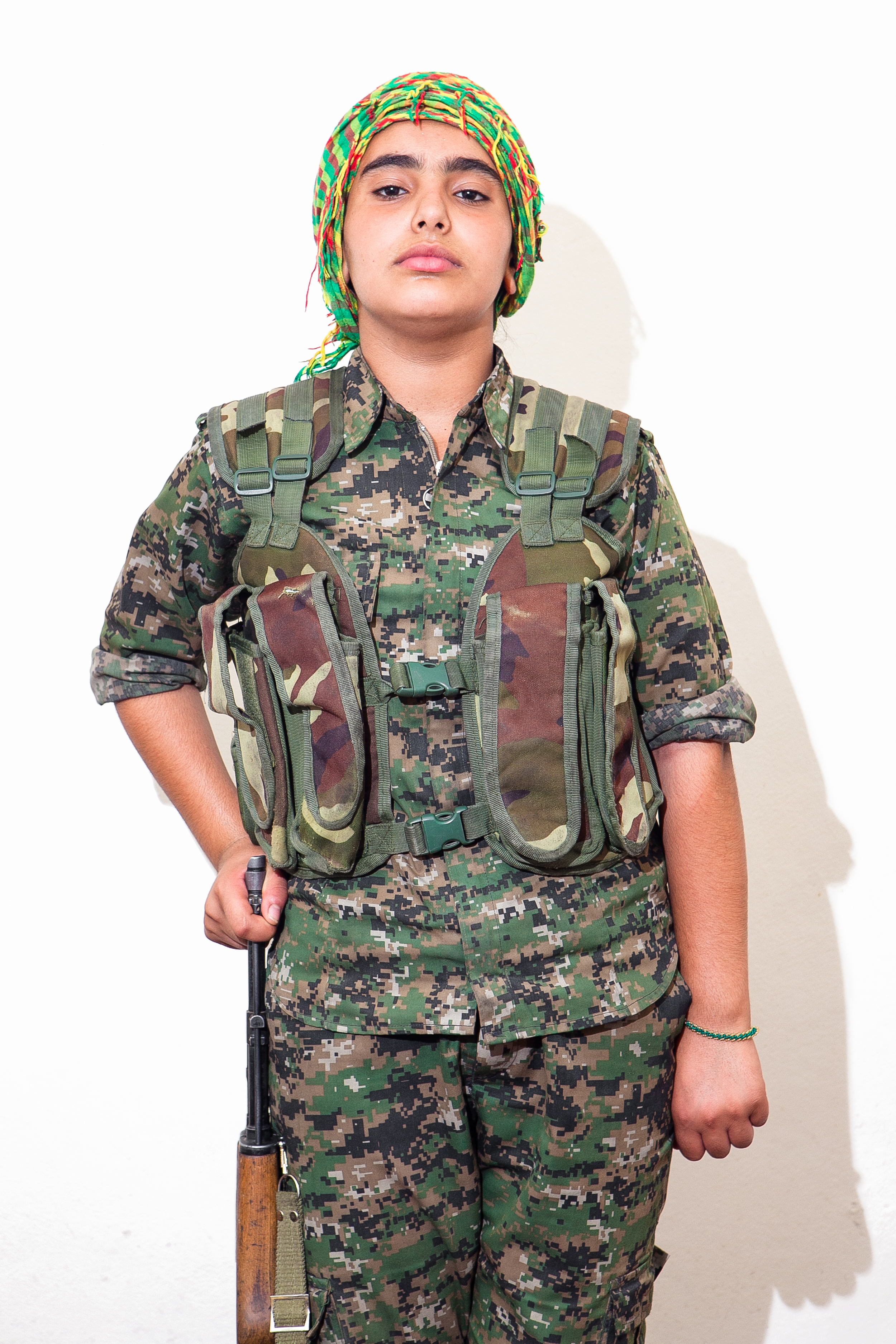
Hevedar Mohammed, 12.
“One day I went home and told my mother that I wanted to join the YPJ. At first she said no, because I was too small, but she finally said I could. My father said he was very proud of me. All of the soldiers tell me they love me very much, that I am not just their friend but that I am also their sister.”
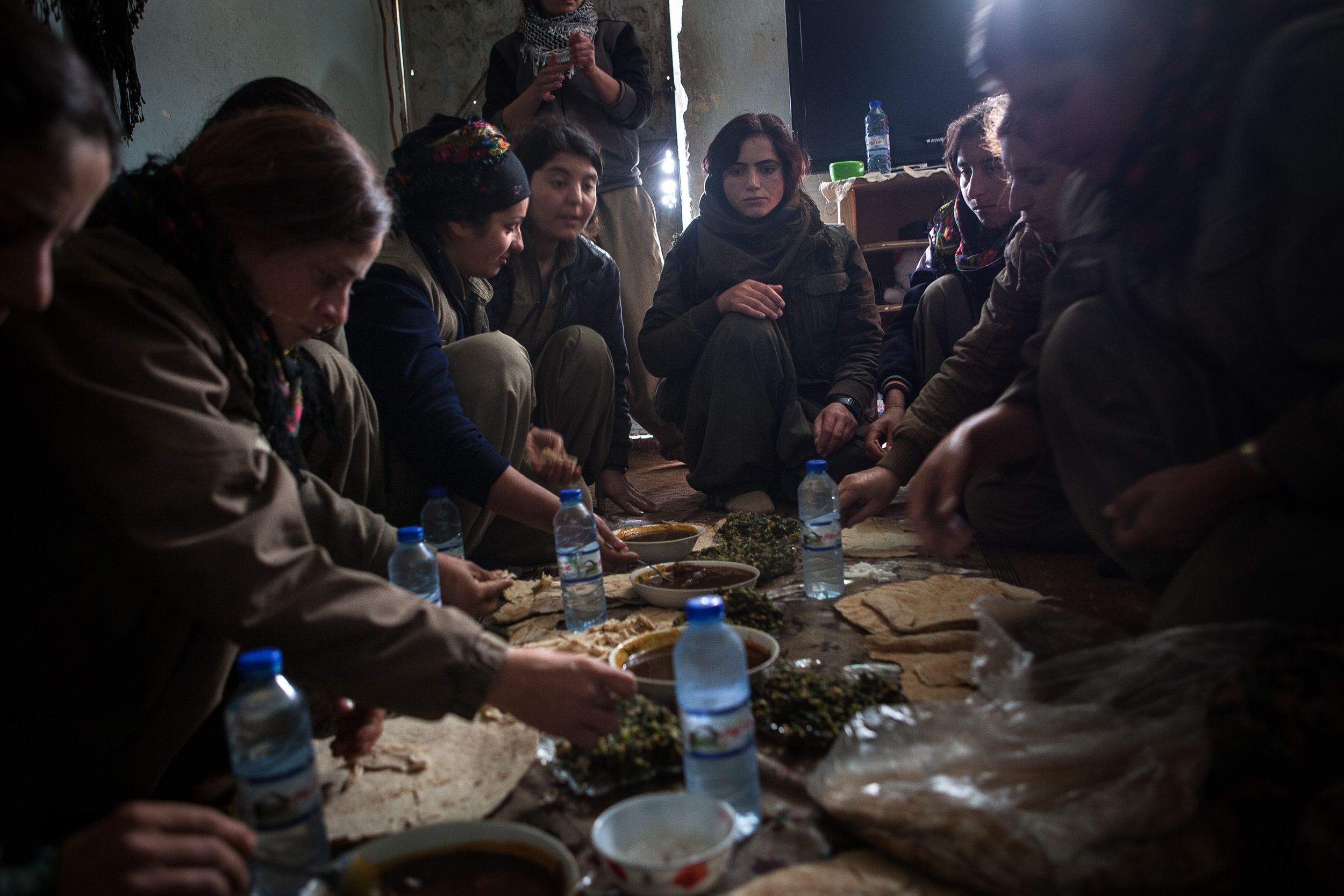
PKK guerrillas eat dinner at their post near Sinjar, Iraq.
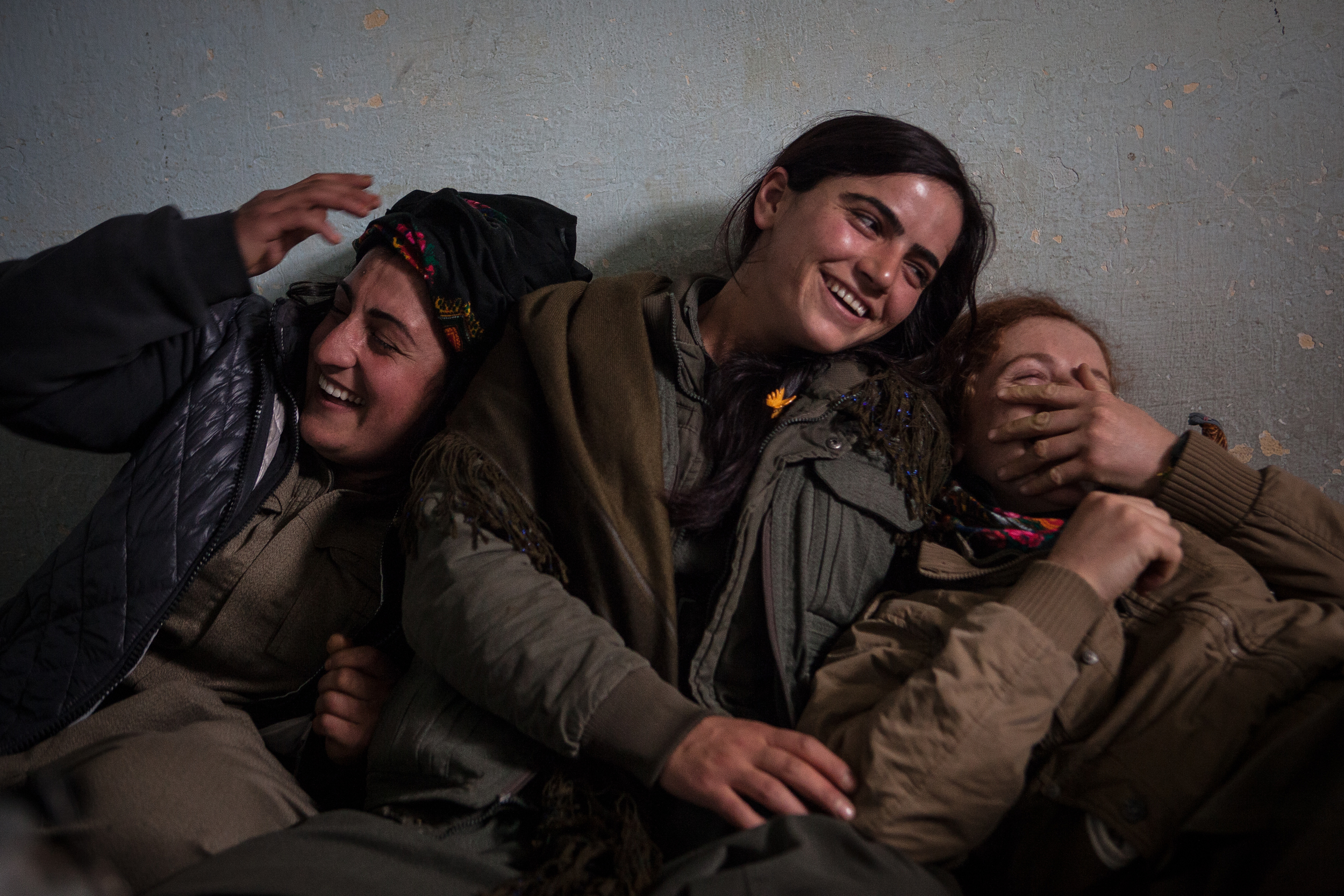
PKK guerrillas at their base near Sinjar, Iraq.
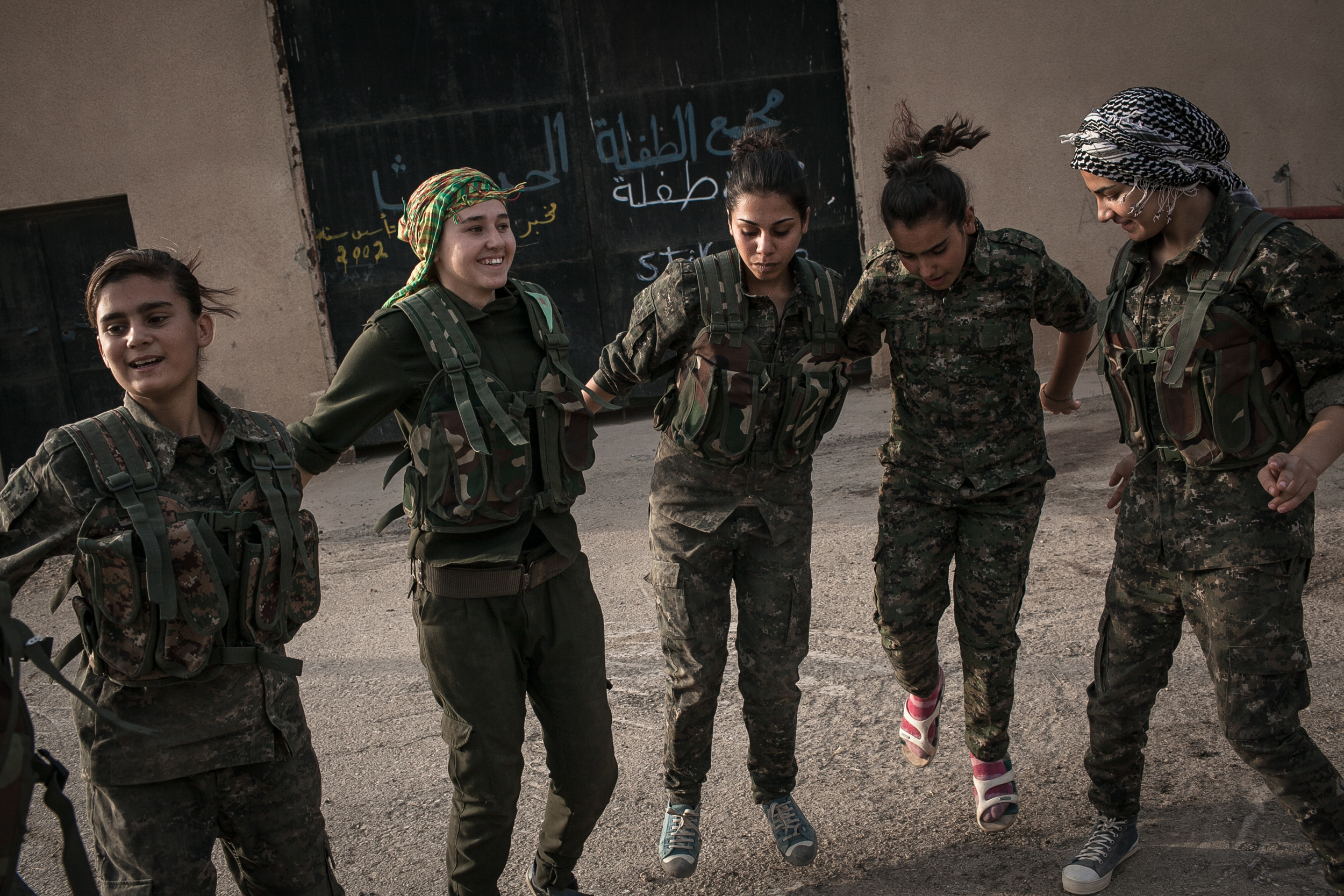
YPJ recruits dance and sing traditional Kurdish songs at dawn near Derek City, Syria.
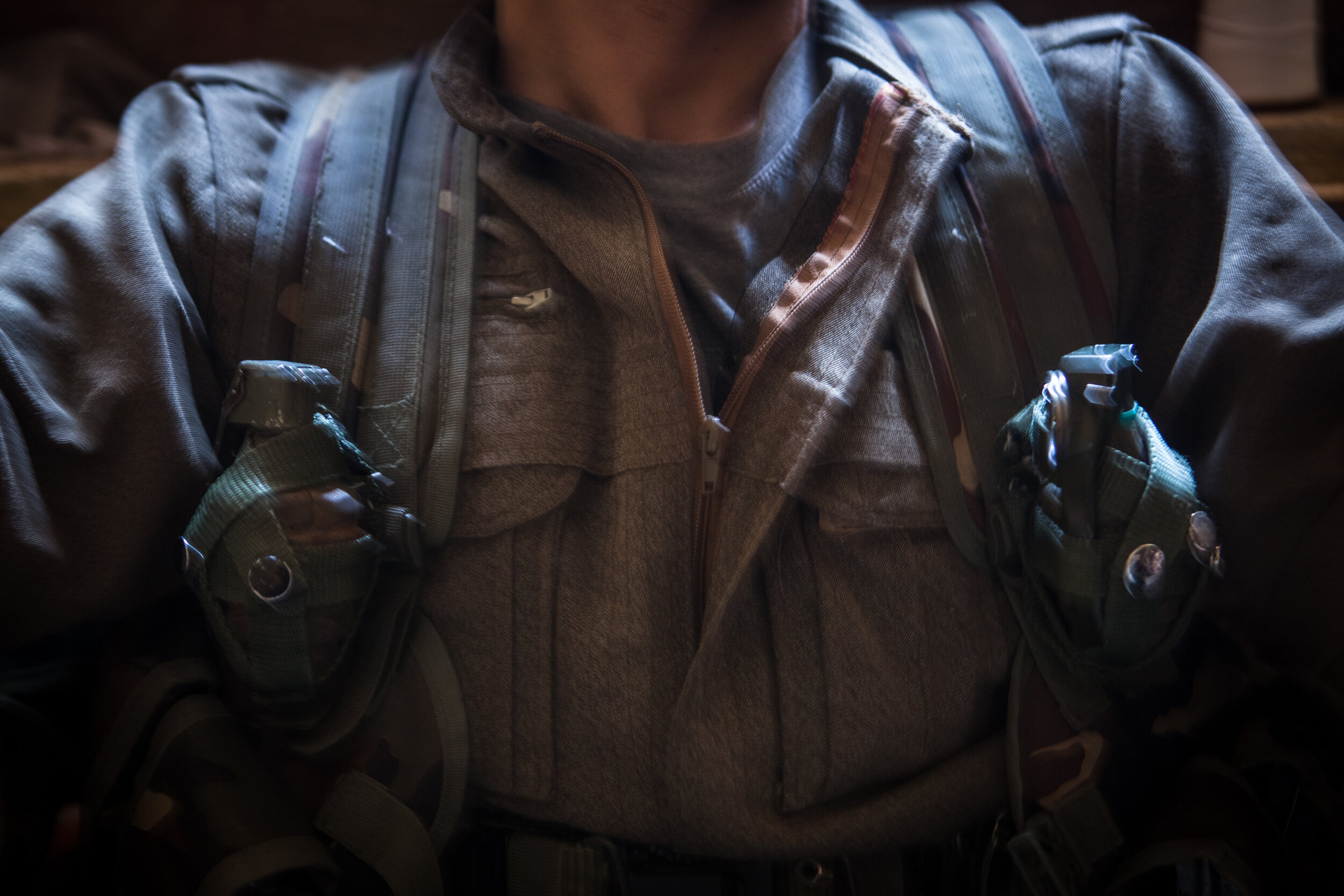
A PKK guerrilla with grenades in Sinjar, Iraq.
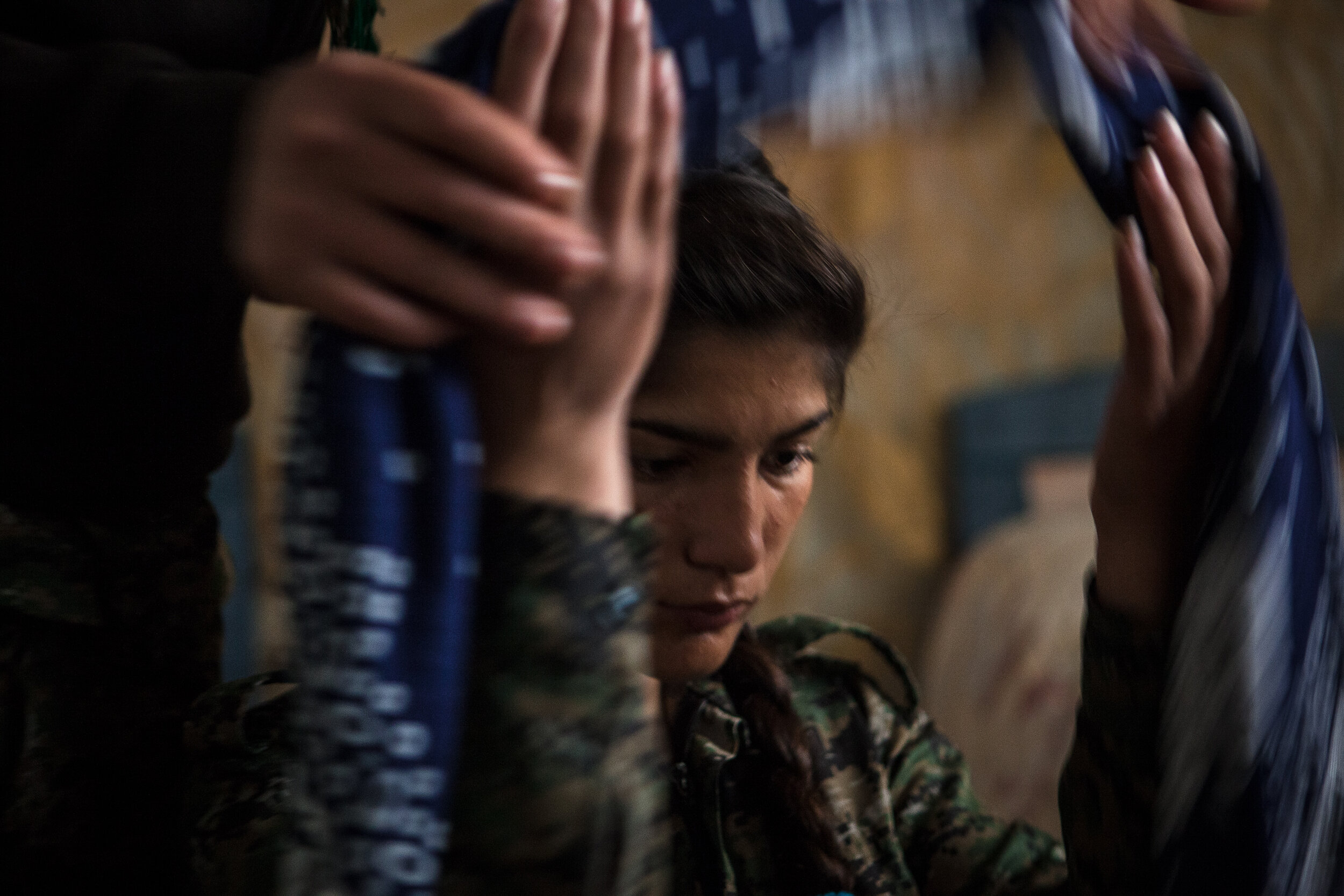
A YPJ soldier covers her head with a scarf, Syria.
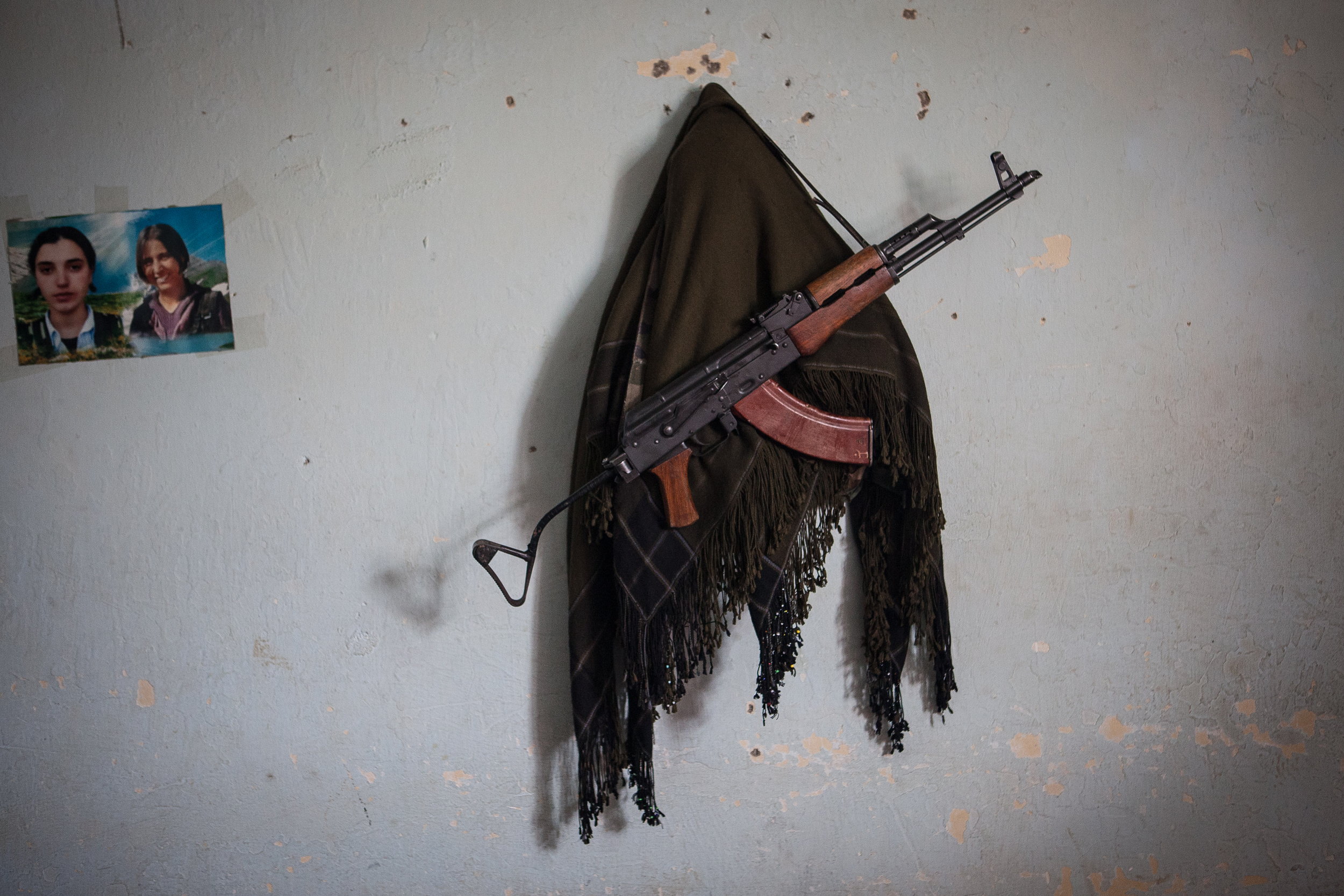
A PKK guerrilla’s traditional scarf and AK-47 hang on the wall of a ou-post near Sinjar, Iraq.




































A Kurdish YPJ soldiers waves at carloads of refugees escaping ISIS near the town of Til Kocer on the Syrian-Iraq border.
We Are The YPJ
Along Syria’s northeastern border thousands of female soldiers are fighting an incalculably dangerous war. They are the Women's Protection Unit, the YPJ - an all-female Kurdish guerrilla military in Syria, formed as an off-shoot of the PKK to defend their people against warfare led by Syrian President Bashar al-Assad and ISIS. For the YPJ fighting is a means necessary for survival, while choosing the lifestyle of a female soldiers breaks down gender and female-Muslim roles solidified by centuries. ISIS militants believe they will be deprived of heaven if killed by a woman; the YPJ take great pride in killing ISIS militants for this reason. Although the United States’ special forces units trained and equipped the YPJ with weapons to fight militants during the height of Iraq’s fight against ISIS, many countries,
including neighboring Turkey, consider the YPJ a terrorist group.
Young YPJ recruits participate in drills at dawn near Derek City, Syria. The YPJ schedule is demanding and discipline driven - new recruits get 6 hours of sleep and wake at 4 AM for physical training; afterwards, their day consists of drills and classroom lessons. Before joining the YPJ many of the girls had never participated in physical activity or exercise before.
YPJ soldier Shavin Bachouk sleeps at an abandoned army post on the outskirts of Raabia, Iraq. Many YPG / YPJ soldier stake out at on the Syrian-Iraq border to fend of ISIS attacks.
A young YPJ recruit, center, arrives on her first day to the YPJ training base near Derek City, Syria.
Evin Ahmed, 28.
"We defend everyone in Rojava no matter what race or religion they are. We are very strong women, we aren’t afraid of anything. I love being a YPJ soldier, I love the other soldiers, we are closer than sisters. This is the only life for me. I can’t imagine living any other way.”
YPJ soldiers have breakfast at their military post near the Syrian-Iraq border in Til Kocer, Syria. YPJ meals are modest since most of their supplies and food are donated from local community members.
Young YPJ recruits fix their hair at 4:30 AM before training drills near Derek City, Syria.
YPJ soldiers cook dinner at their base near Sinjar, Iraq.
Hasrat Sahad, 23; photographed on the outskirts of Raabia, Iraq.
Zevin Botan, 20; photographed on the outskirts of Raabia, Iraq.
PKK guerrilla Zin Roken, 24. When ISIS attacked Sinjar in 2014, killing and capturing thousands of Yazidis (an ethnic and religious minority in Iraq) while additional tens of thousands were forced to flee, the PKK guerrillas took up arms to defend the Yazidis and their homeland.
Jin, left, a YPJ soldier, is hugged by her mother, Amina, at their home in Girke Lege, Syria. Although she lives at a YPJ base near her mother’s home, Jin had not seen her mother in months because of the YPJ’s demanding training schedule.
YPJ soldier, Amara, wears a red, yellow and green patch, the official flag of the YPJ, on her uniform near Girke Lege, Syria.
Shavin Bachouk, 26; photographed on the outskirts of Raabia, Iraq.
Shavin Bachouk, 26; photographed on the outskirts of Raabia, Iraq.
A PKK guerrilla is bandaged after being wounded by shrapnel while fighting ISIS militants in Sinjar, Iraq.
A family mourns for a YPG soldier who was killed in action while fighting against ISIS along the Syrian-Iraq border.
YPJ members carry the coffin of a fellow soldier who was killed by ISIS at a funeral along the Syrian-Iraq border.
Narlene, 20; photographed on the outskirts of Raabia, Iraq.
Avinar Kolcer, 26; photographed on the outskirts of Raabia, Iraq.
Mizguin Ronahi; photographed on the outskirts of Raabia, Iraq.
A YPJ Soldier cradles two pet bunnies, Sinjar, Iraq.
Nuhad Kocer, 29, sits near the television; on the left, a doll nicknamed "Azadi", in Til Kocer, Syria. "Azadi the doll" was named after YPJ soldier Azadi Ristem, pictured in the photo frame on the left, who was killed by sniper fire by Jibhad L'Nasra, a faction group of Al Quaeda.
YPJ recruits exercise at dawn, near Derek City, Syria.
Captain Ronahi Anduk, 34, left, Gian Dirik, center, and Dirsim Judi, 18, right, fix the DShK weapon at a YPJ military base in Til Kocer, Syria. The DShK weapon is a Soviet machine gun typically used as an anti-aircraft wepaon, but the YPJ use it to fight ISIS.
General Zelal, 33; photographed on the outskirts of Raabia, Iraq.
General Zelal, 33; photographed on the outskirts of Raabia, Iraq.
Azadi Qamishlo, 22, has her eyebrows plucked by a fellow soldier at a YPJ military base in the town of Til Kocer, Syria.
Hevedar Mohammed, 12.
“One day I went home and told my mother that I wanted to join the YPJ. At first she said no, because I was too small, but she finally said I could. My father said he was very proud of me. All of the soldiers tell me they love me very much, that I am not just their friend but that I am also their sister.”
PKK guerrillas eat dinner at their post near Sinjar, Iraq.
PKK guerrillas at their base near Sinjar, Iraq.
YPJ recruits dance and sing traditional Kurdish songs at dawn near Derek City, Syria.
A PKK guerrilla with grenades in Sinjar, Iraq.
A YPJ soldier covers her head with a scarf, Syria.
A PKK guerrilla’s traditional scarf and AK-47 hang on the wall of a ou-post near Sinjar, Iraq.
